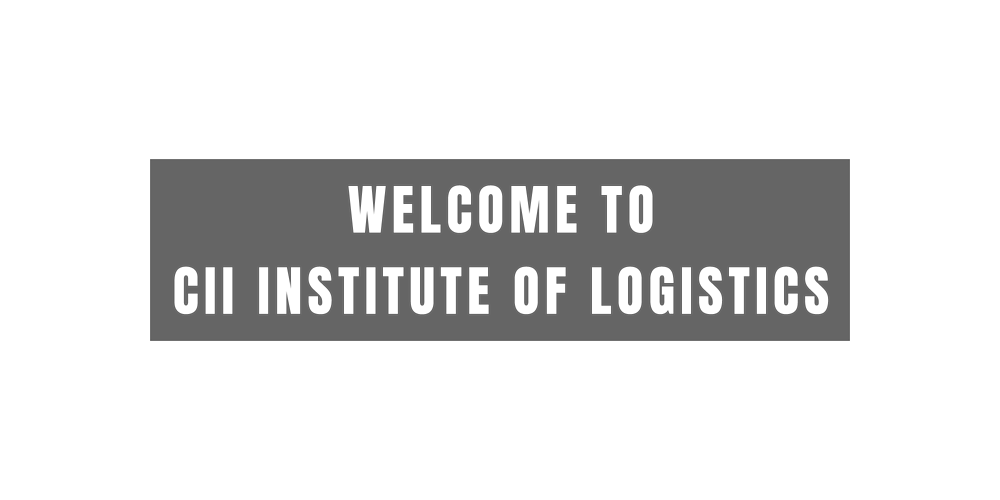
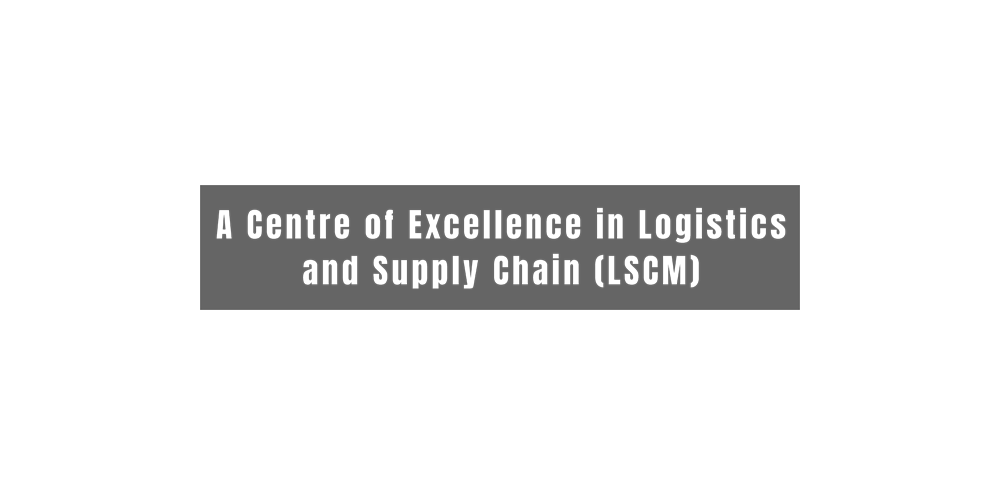

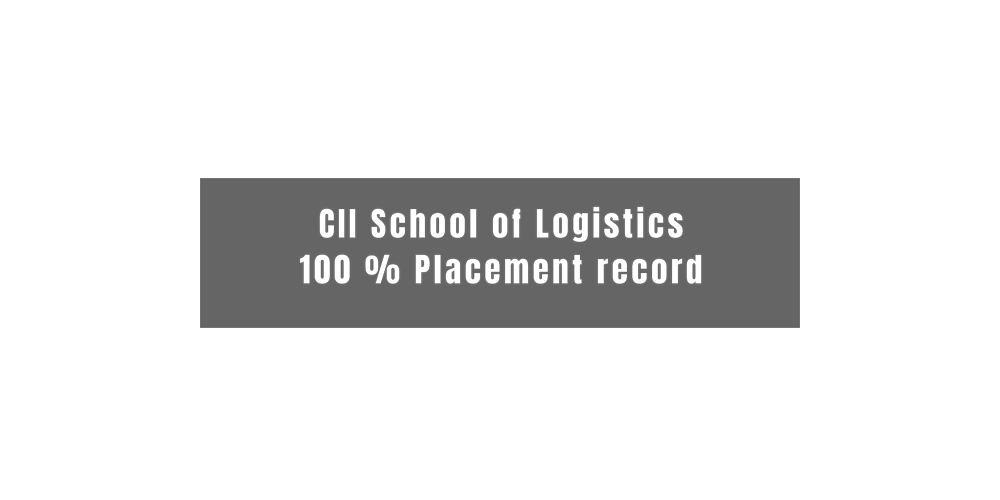








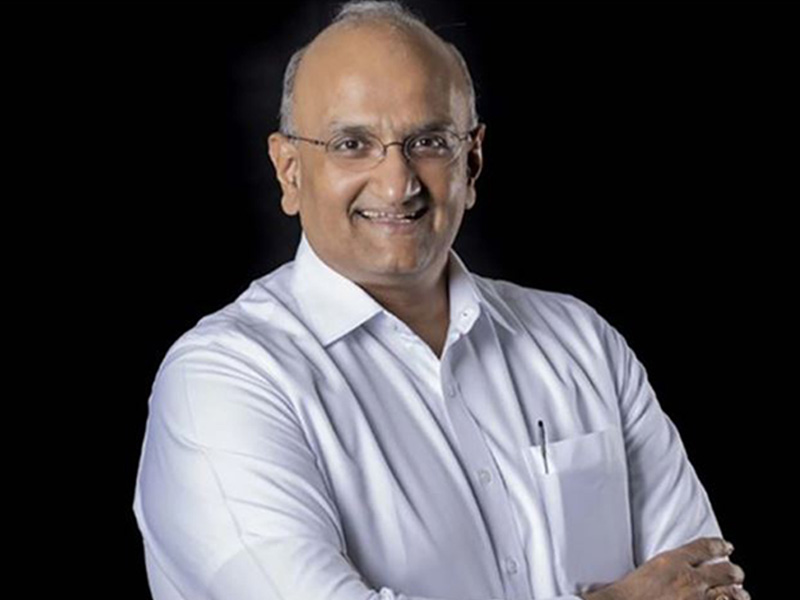
CII Institute of Logistics (CII IL) a Centre of Excellence established by Confederation of Indian Industry work towards competitive edge of National Supply Chain sector and Indian industry, thereby evolving global benchmark standards. CII IL aligns closely with government initiatives, supplementing infra-projects with both first mile and last mile connectivity thereby bridging the gaps ensuring overall transactional cost effectiveness. The Centre also works in the logistics sector for embracing apt digital technologies through capacity building of both infrastructure and human assets for industry competitiveness. CII IL constantly works towards evolving industry-best practices, standards and monitor benchmark parameters encompassing sustainable solutions throughout end-to-end supply chain functions to transform green supply solutions into the value chain.
R Dinesh ChairmanCII Institute of Logistics


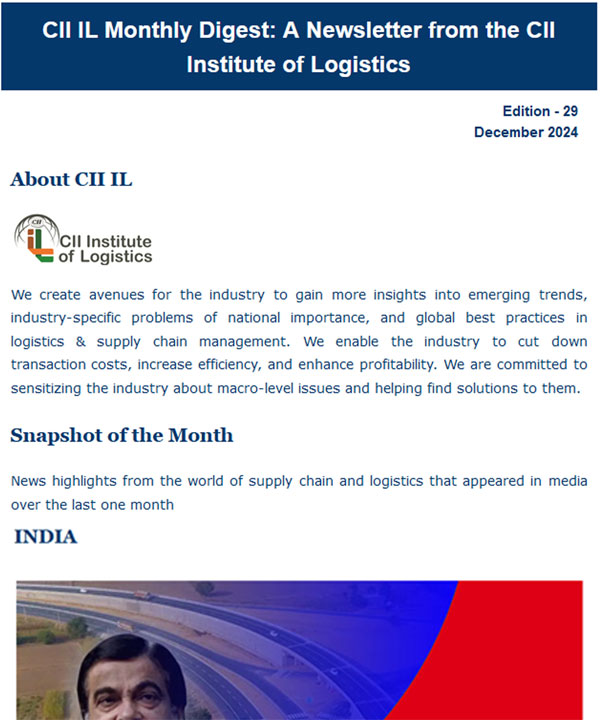
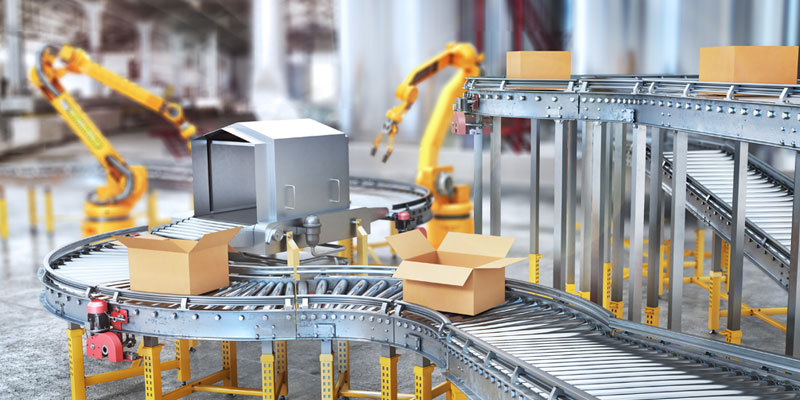
12th September 2025, Friday Taj Santacruz, Mumbai
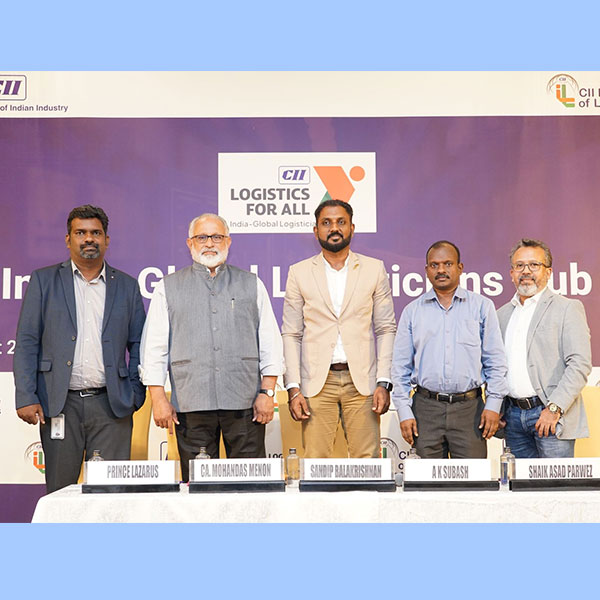
22nd August 2025, Friday Holiday Inn, Kochi
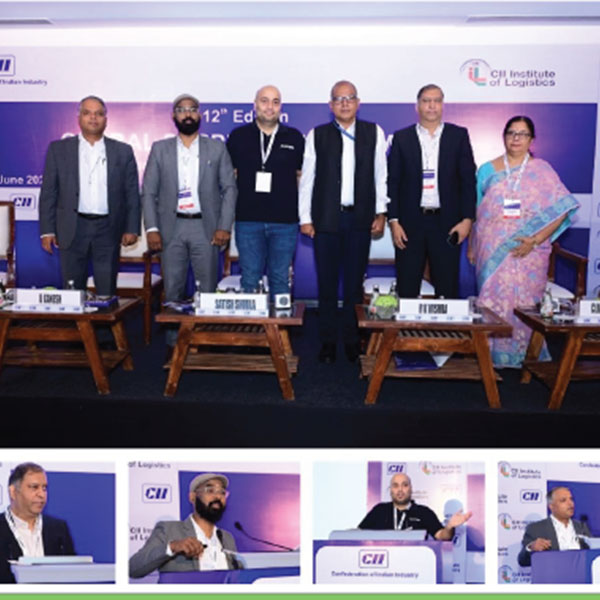
13th June 2025, Friday St. Regis, Mumbai
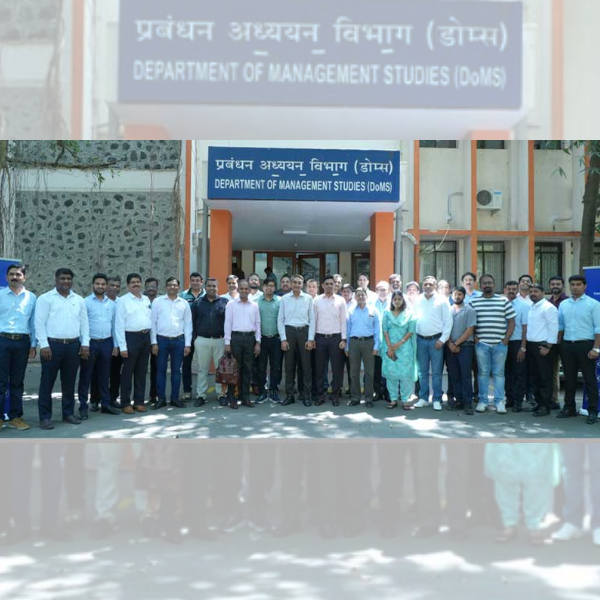
February 2025
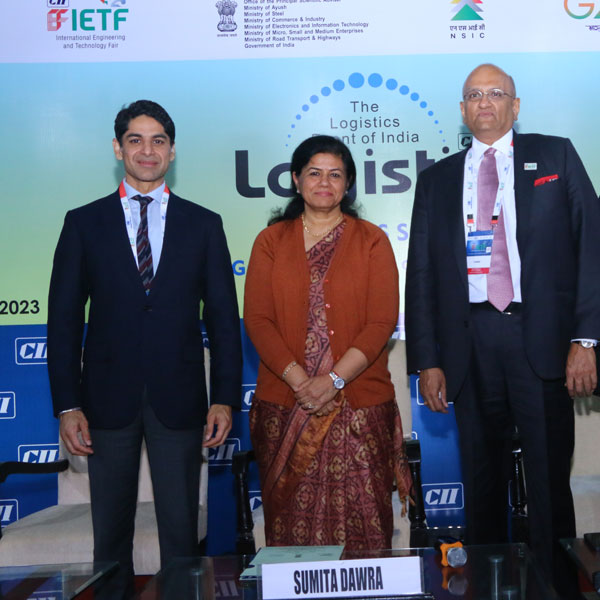
Best place for industry practitioners to interact with the leaders in the field and network with the peers.
More
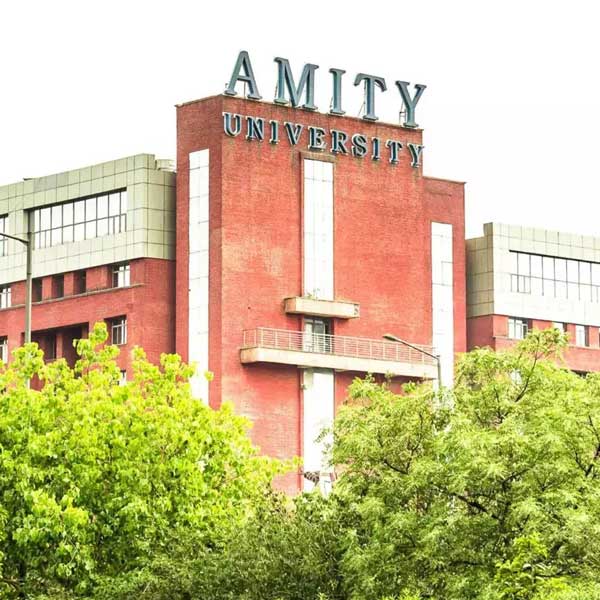
The CII School of Logistics is a unique Industry-Academia tie-up created for the purpose of producing professionals.
More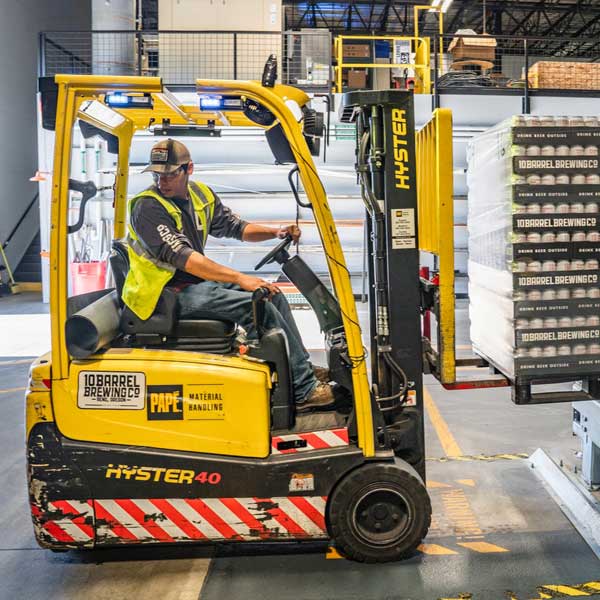
Enhances existing skill set and brings in additional manpower to meet increased demand in the sector.
More

CII has the insight, expertise and industry reach to create and implement effective strategies that deliver tangible, sustainable results.
More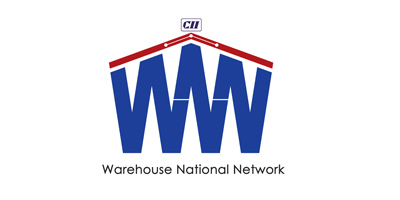

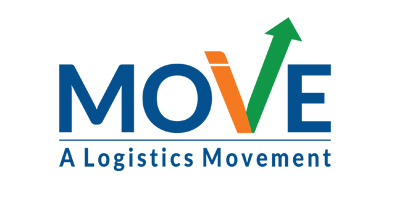
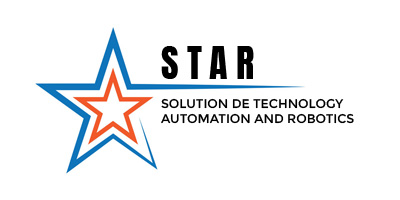
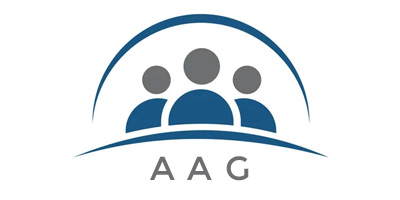

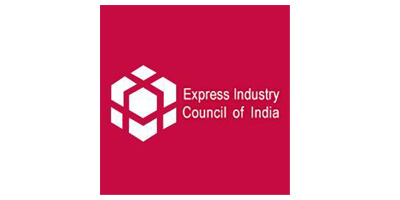
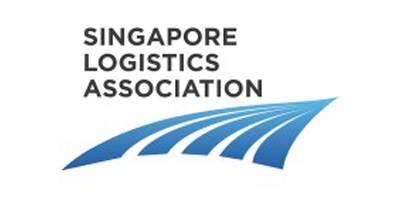
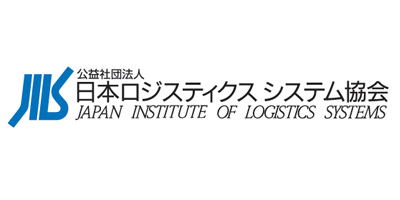
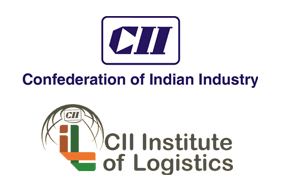
CII -Institute of Logistics Phase II - "B" Block, 9th Floor IIT Madras Research Park Kanagam Road, Taramani Chennai - 600113 Tamilnadu, India
CII Institute of Logistics (CII-IL) organized the "Summit on Technology Automation and Robotics (STAR 2025) in Supply Chain" with the theme, "The Smart Logistics Trinity - AI, Robotics and Data", on 12th September, Friday at Taj Santacruz, Mumbai. The conference focused on key themes including Navigating robust technologies for warehouse transformation, Unlocking supply chain agility with IoT & predictive insights and the future of transportation: AVS, EVS & intelligent TMS providing valuable insights into improving warehouse operations to meet India’s evolving logistics needs. The sessions covered practical approaches such as implementing cost-effective automation, using data for space optimisation, setting up urban fulfilment centres, and creating safe and efficient work environments. Emphasis was placed on the role of smart technologies, sustainable practices, and ergonomic design in building future-ready, scalable, and people-focused warehousing systems. The conference saw strong participation, with over 200 national leaders and experts sharing their knowledge and experiences.
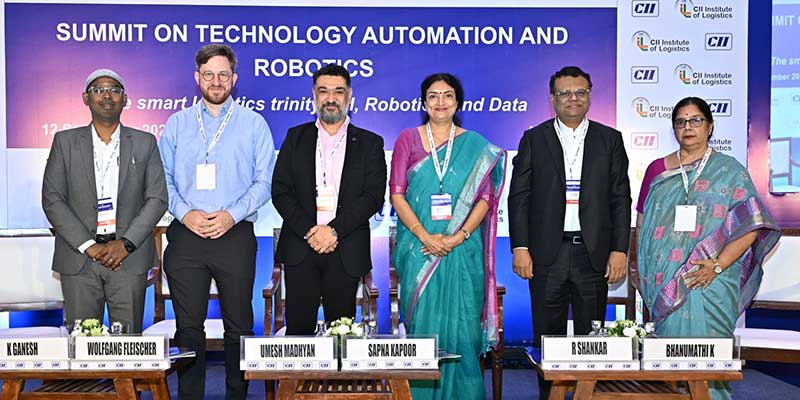
(L-R) Dr. K Ganesh, Member, CII National Committee on Logistics & Partner, McKinsey & Company, Mr. Wolfgang Fleischer, Supply Chain Expert – Germany, McKinsey & Company, Mr. Umesh Madhyan, Member - CII National Committee on Logistics, Chief Operating Officer, LEAP India Limited, Ms.Sapna Kapoor, State Informatic Officer Maharashtra, National Informatic Centre – NIC, Ministry of Electronics and Information Technology, Mr. Shankar Ramalingam, Member, CII National Committee on Logistics and Co-Founder & Director, LinkMiles Mobility Private Limited, Dr Bhanumathi, Chief Operation Officer, CII Institute of Logistics.
Informatics Officer – NIC Maharashtra, Ministry of Electronics and Information Technology, highlighted that uncertainty defines today’s supply chains, with disruptions arising from geopolitical conflicts, climate-driven losses, and operational inefficiencies, all of which increase costs and risks. She emphasized the need for agile, technology-driven logistics models to strengthen resilience and competitiveness. She also underlined the transformative role of robotics in warehouses and manufacturing, enabling speed, safety, and new possibilities with humanoid technologies. Turning to India’s logistics landscape, she pointed out that costs remain nearly double those of advanced economies, affecting competitiveness, and stressed the importance of the National Logistics Policy – Saksham Bharat by 2030. She further introduced RAISE – a Roadmap for India’s Logistics Transformation – built on pillars such as robotics integration, data-driven operations, disruption readiness, AI adoption, and sustainability practices. Concluding her address, she remarked that India’s logistics sector is at a defining moment, and with digital adoption, innovation, and policy reforms, the country is poised to emerge as a global logistics hub. The session also highlighted the growing adoption of shared and standardized logistics infrastructure as a key driver of efficiency. Models such as pallet pooling, returnable packaging, and equipment sharing are already helping businesses cut waste, improve utilization, and lower costs. The discussion emphasized that the task ahead is not only to adopt new technologies but also to integrate them into systems that are inclusive, sustainable, and future-ready. The future of industrial automation and the increasing importance of digital solutions at the shop floor were also underlined, with key technological trends setting new benchmarks of performance across different stages of maturity.
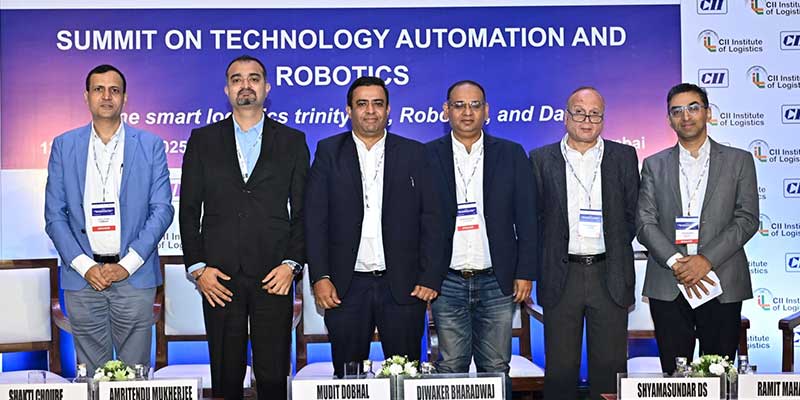
(L-R) Mr. Shakti Choube, Senior Vice President & Business Head, Craftsman Automation, Mr. Amritendu Mukherjee, Head Global Logistics, Dr. Reddy's Laboratories, Mr. Mudit Dobhal, Senior Vice President - Strategy & Business Development, IndoSpace, Mr. Diwaker Bharadwaj, President Automation/Serialization, Packaging & Brand Protection, Polycab India Limited, Mr. SHYAMASUNDAR DS, National Warehousing Lead, Mondelēz International, Mr. Ramit Mahajan, Member – CII National Committee on Logistics &Head Customer Experience and Supply Chain Enablement – IMEA, Henkel
Session 1: Navigating Robust Technologies for Warehouse Transformation focused on the adoption of AI-driven Warehouse Execution Systems (WES) and their role in reshaping warehouse operations by 2030. Speakers shared how real-time data flows are enabling AI-based decision-making for inventory prediction, dynamic storage allocation, and intelligent picking and sorting — enhancing throughput while reducing costs. Case studies from SMEs, mid-sized enterprises, and large organizations showcased practical challenges and measurable improvements achieved through WES adoption. The discussion also evaluated the ROI of warehouse technologies, including robotics, WMS upgrades, and data-driven intelligence, with insights on modular pilots versus full-scale automation. A key takeaway was that automation is not about reducing jobs but shifting roles, creating opportunities that call for continuous workforce reskilling. With India’s warehousing sector evolving rapidly — from e-commerce demanding faster fulfillment to SMEs preferring asset-light solutions — the session emphasized how Grade A infrastructure, bundled automation offerings, and scalable AI-WES adoption can accelerate India’s journey toward a future-ready warehousing hub.
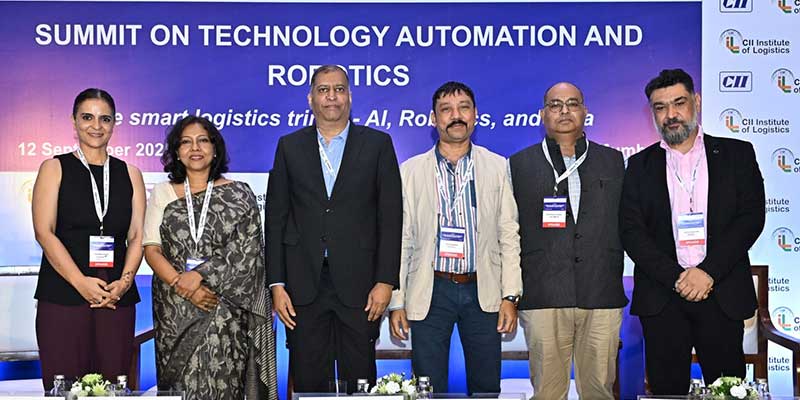
(L-R) Ms. Priyanka Shivan, Head Supply Chain - South Asia, Clariant, Ms. Suparna Singh, Head Corporate Strategy - Special Projects, Larsen & Toubro, Mr. Clifford Patrao, Member – CII Institute of Logistics Advisory Council and Senior Partner - Data & AI, IBM, Mr. Vijay Nagariya, Vice President - Supply Chain & Organized Retail, Drums Food International Pvt Ltd (epigamia), Mr. Bhartendu Narera, Head Logistics Operations, Samsonite, Mr.UmeshMadhyan, Member - CII National Committee on Logistics and Chief Operating Officer, LEAP India Limited
Session II: Unlocking Supply Chain Agility with IoT and Predictive Insights highlighted the role of robust data infrastructure and IT–OT integration in enabling accurate demand forecasting, inventory optimization, and proactive risk management. Case studies demonstrated how data-driven insights and tools such as AI-based time-series models and autonomous mobile robots are enhancing operational efficiency. IoT-enabled solutions were discussed to contribute to sustainability by tracking carbon emissions and promoting energy-efficient logistics practices. Panel members emphasized the importance of translating data insights into actionable strategies to generate measurable value. Ethical considerations and the responsible use of data in connected logistics ecosystems were also identified as critical success factors. AI-driven forecasting tools and real-time applications illustrated the growing maturity of these technologies. The session concluded that IoT, AI, and predictive intelligence will not only improve resilience but also drive sustainability and competitiveness in the evolving supply chain landscape.
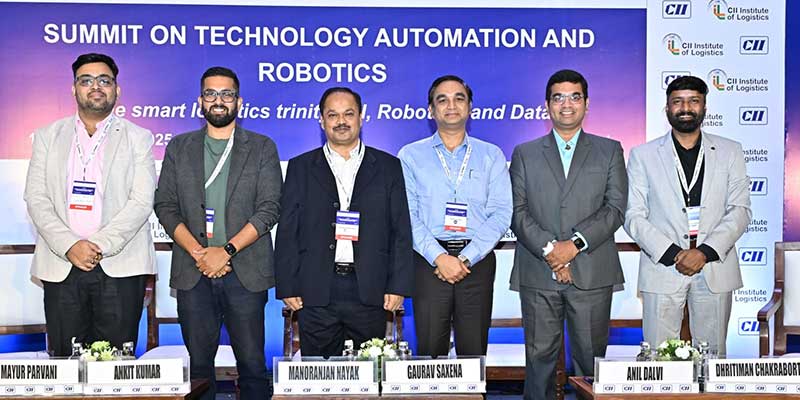
(L-R) Mr.MayurParvani, Lead demand planner, UltraTech Cement - Building Products division, Mr. Ankit Kumar, Founder and Chief Executive Officer, Skye Air Mobility, Dr. Manoranjan Nayak, Head Logistics, Shipping and Warehousing, African Industries Group, Mr. Gaurav Saxena, Head of Project Supply Chain, Reliance Industries Limited, Mr. Anil Dalvi, Vice President Supply Chain, Tata Play Ltd, Mr. Dhritiman Chakraborty, Director Operations, Ingram Micro
Session III: The Future of Transportation Avs EVs and Intelligent TMS examined the rapid advancements in autonomous vehicles (AVs), electric vehicles (EVs), and intelligent transportation management systems (TMS) and their impact on the logistics sector. Discussions covered the adaptability of AV technology, its anticipated rollout on public roads, and implications for traffic flow, safety, and operational efficiency. Speakers highlighted how AI and machine learning are transforming TMS with optimized routing, real-time shipment visibility, and automated decision-making across multimodal networks. The session also addressed infrastructure readiness and regulatory support required to scale EV and AV adoption in India, along with the role of digital control towers in ensuring end-to-end visibility. Case examples such as Tata Play’s AI-led supply chain solutions and UltraTech’s EV truck pilots demonstrated early adoption of sustainable and intelligent transportation. The potential of drones in integrated logistics ecosystems was also explored, with insights into emerging applications, regulatory hurdles, and opportunities to link drones, EVs, and AVs through a unified TMS. Comparative perspectives between India and Africa offered valuable lessons on regional innovation pathways. The session concluded that the convergence of EVs, AVs, drones, and intelligent TMS could redefine India’s transportation landscape, provided infrastructure development, supportive policies, and strong industry collaboration progress in tandem.
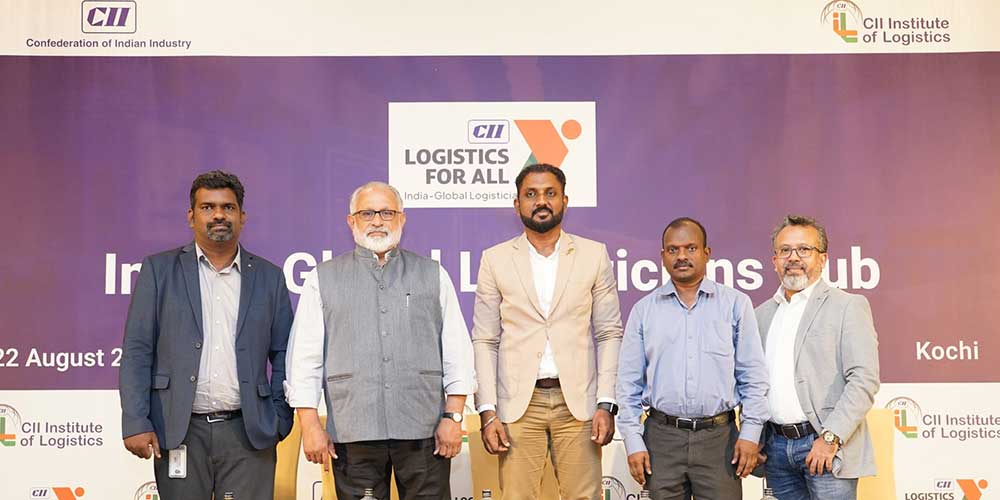
(L-R) Mr. Prince Lazarus, Head Placements – CII IL, Mr. CA Mohandas Menon, Panel Member - "Logistics for All", CII Institute of Logistics, Mr. Sandip Balakrishnan, Chief Operating Officer, Manjilas Food Tech Pvt Ltd, Mr. A K Subash, General Manager HR & LD, Cochin Shipyard Limited, Mr. Shaik Asad Parwez, Head Logistics & Warehousing, V-Guard Industries Ltd
The Confederation of Indian Industry (CII), through its Institute of Logistics, held an engaging and interactive session today in Cochin, aimed at inspiring students and guiding them toward rewarding careers in the logistics sector. This initiative aligns with CII’s vision of positioning India as a “Global Logisticians Hub” under its mission "Logistics for All." Cochin, Kerala’s commercial capital, is uniquely positioned as a logistics learning hub. Kerala’s industrial ecosystem includes approximately 1.9 lakh micro, small, and medium enterprises (MSMEs) as of March 2025, contributing significantly to employment and economic growth. Ernakulam’s Eloor industrial belt alone hosts over 250 key enterprises, including medium and large-scale industries in sectors like chemicals, electronics, and manufacturing. The region’s strategic strength is enhanced by its strong infrastructure — including the Port of Cochin, Cochin International Airport, a major shipyard, and well-developed road, rail, and waterway connectivity. Additionally, the presence of India’s first transshipment hub at Vizhinjam Port in the broader Kerala region further reinforces Cochin’s position as a pivotal hub for developing logistics talent to support India’s growing manufacturing and trade needs. The CII Institute of Logistics acts as a dynamic platform, bringing together policymakers, industry leaders, academia, training institutions, and communities to cultivate a globally competitive logistics workforce. During the session, key strategies were highlighted, including industry-aligned training programs designed to deliver strong placement outcomes tailored to sector needs, early career exposure initiatives engaging students in grades 10 and 12 to ignite interest in logistics careers, and the establishment of localized training centers in Tier-2 and Tier-3 cities to broaden access to skill development. Additionally, the institute emphasized global partnerships to provide internationally recognized certifications for enhanced employability and a commitment to gender diversity and rural-urban bridging to foster inclusive growth across diverse demographics. Mr. K.V. Mahidhar, Executive Director & Head, CII-Institute of Logistics, stated, “Cochin’s strategic location and vibrant industrial sector position it as an ideal city for nurturing logistics talent. Our mission is to inspire and equip students with the skills and knowledge to excel, not only in India but on the global stage, contributing to a robust and sustainable supply chain ecosystem.” The logistics sector is critical to India’s economic growth, enabling efficient storage, transportation, and supply chain operations for manufacturing and agriculture. According to recent data, India’s logistics market is projected to grow at a CAGR of 8.9% from 2024 to 2030, driven by infrastructure investments and digital transformation. The demand for skilled professionals is surging, with the sector expected to create over 3 million jobs by 2027. CII’s engagement with Cochin’s youth is a strategic step toward preparing future-ready professionals. By leveraging Cochin’s industrial and logistical strengths, CII aims to empower students to strengthen India’s position in the global logistics landscape.
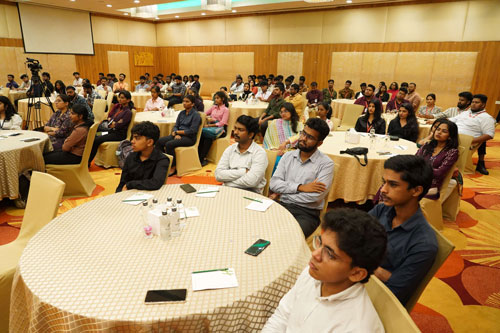
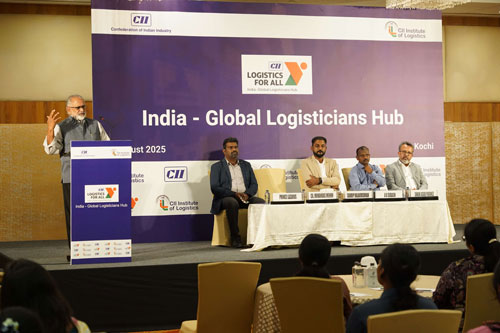
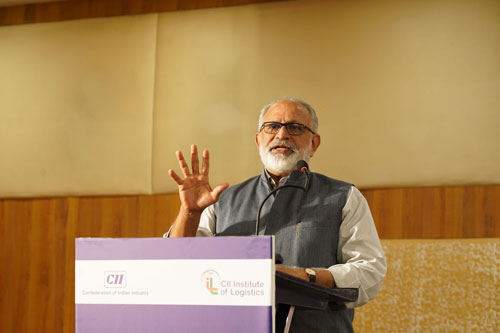
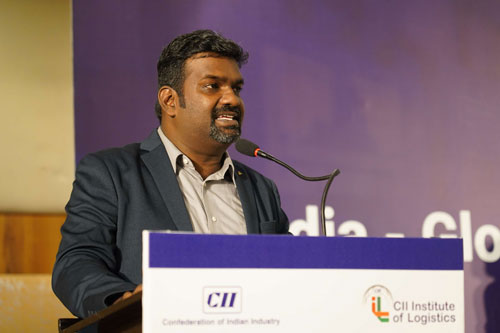
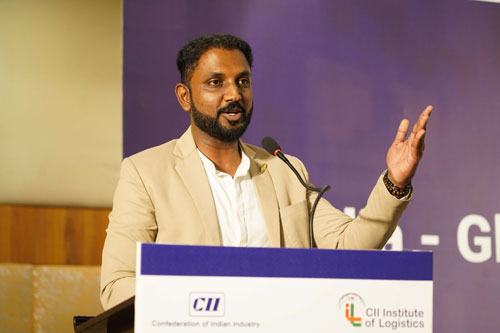
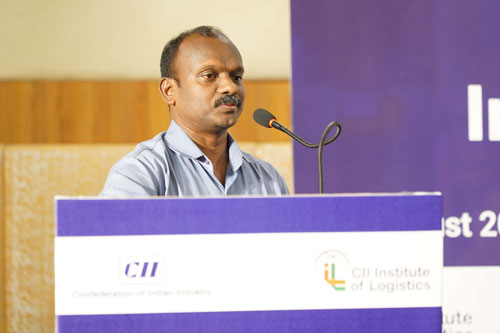
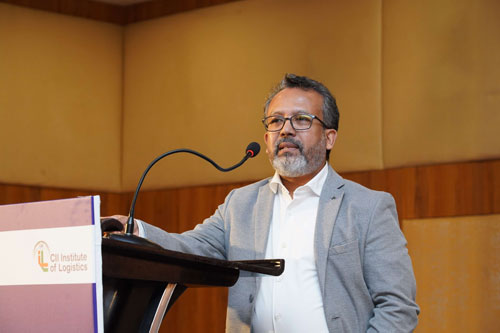
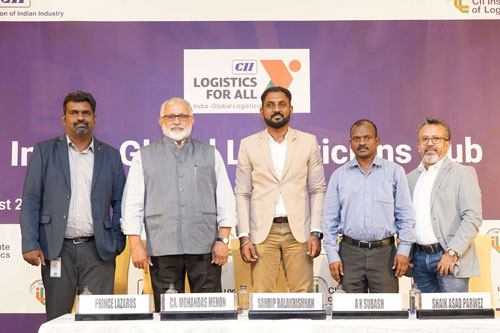
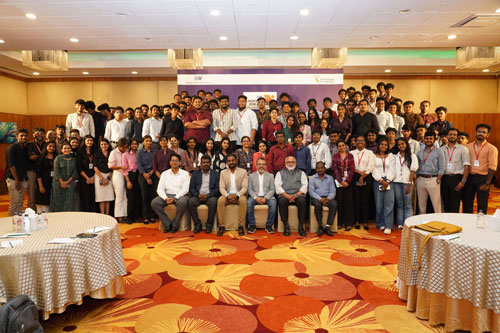
CII Institute of Logistics organized 11th Edition of “Ecommerce Supply Chain” Conference in the theme “Rise of Innovation and GenAI in Ecommerce” on Friday, 24th January at Sheraton Grand at Brigade Gateway, Bengaluru. The conference focused on key sub-themes such as relentless innovation in e-commerce, strategies for success in a multi-channel world, and how emerging technologies can enable supply chain efficiency and boost operationsit explored cutting-edge e-commerce supply chain models, next-generation fulfilment infrastructure, and regulatory advancements shaping the future of digital commerce.The conference witnessed significant participation, with 210 national and international thought leaders and influential figures from across India contributing their insights and expertise.

L-R Dr. K. Ganesh, Member, CII National Committee on Logistics & Partner, McKinsey &Company, Mr. C S Babu Ganesh, Joint Director, Visvesvaraya Trade Promotion Centre, Government of Karnataka, Mr. Abhishek Bansal, Co-Founder & Chief Executive Officer, Shadowfax, Mr. Abhishek Prakash, Chief Executive Officer, BEUMER Group, Dr Bhanumathi K, Chief Operating Officer, CII Institute of Logistics.
Mr C S Babu Nagesh, Joint Director, Visvesvaraya Trade Promotion Centre (VTPC), Government of Karnataka, delivered the inaugural address, emphasizing how AI technologies are revolutionizing supply chains, enabling Karnataka to access global markets faster through analytics and automation, contributing to the state’s consistent 10% export growth. Mr. Babu Nagesh also shared VTPC’s initiatives, including integrating AI for global outreach and establishing a Facilitation Cell that leverages real-time insights to help overcome logistical and regulatory challenges effectively. Furthermore, he highlighted the Government of India’s Trade Infrastructure for Export Scheme (TIES), which fosters the development of advanced infrastructure enhancing operational efficiency while maintaining a strong focus on sustainability. The session also discussed the rapid expansion of e-commerce in India, driven by factors such as increasing market penetration, technological progress, and the growing middle class, alongside wider internet access and smartphone usage. With predictions suggesting that India's e-commerce industry will reach $325 billion by 2030, the potential for business growth is substantial. The discussion also highlighted the rising consumer demand for sustainable practices, particularly in packaging, waste management, and transportation costs. These challenges were identified as key areas for innovation, with a focus on making the e-commerce sector more environmentally responsible while continuing its growth.
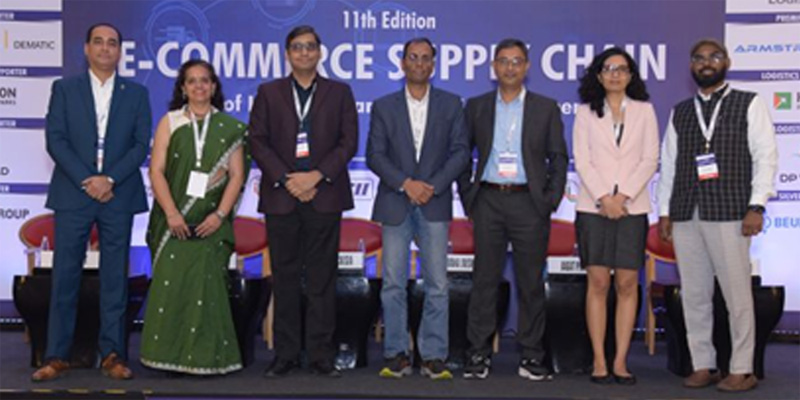
L-R Mr. Punit Dutt, Senior Director, Head of Consumer Sector, SCO, DP World, Ms. Lavanya Pachisia, Chief Executive Officer, Zivame, Mr. Aashutosh Taparia, Head of Logistics (LMD & Transportation), bigbasket.com, Mr. Anubhav Agnihotri, Head Inventory Management and Distribution, Clicktech Retail Pvt Ltd, Mr. Jagat Pradip Das, Director Supply Chain Operational Excellence, Flipkart, Ms. Bhavana Jaiswal, Head of E Commerce, IKEA India, Dr. K. Ganesh, Member, CII National Committee on Logistics & Partner, McKinsey & Company
In Session 1, “Relentless Innovationin Ecommerce” the discussion focused on the future of ecommerce in India, addressing infrastructure gaps and last-mile delivery challenges. Innovations in mobile ecommerce and AI-driven hyper-personalization were explored, enabling brands to analyze data and predict customer behavior. The panel also discussed how data analytics can predict demand fluctuations and optimize inventory, alongside the role of micro-fulfilment centers in enhancing last-mile logistics. Challenges in managing logistics and partnerships to strengthen ecommerce were examined, with an emphasis on the long-term growth potential of quick commerce, profitability, and reducing operational errors. The session concluded with insights into global B2B ecommerce platforms that enhance reliability and innovative customer service solutions.
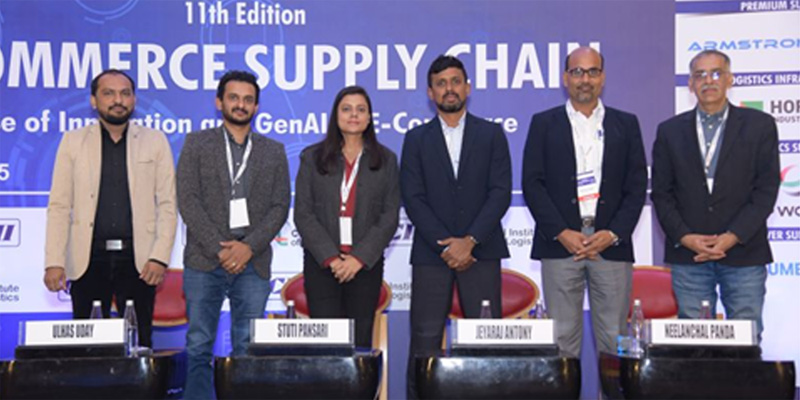
L-R Mr. Pranay Moon, Associate Director - SCM Planning & Growth, Zepto, Mr. Ulhas Uday, Business Head of Ecommerce, Seiko India, Ms. Stuti Pansari, Head of Logistics, ONDC, Mr. Jeyaraj Antony, Head of Leasing - South, Horizon Industrial Park, Mr. Neelanchal Panda, Head of Supply Chain, Himalaya Wellness Company, Mr. Deven Pabaru, Chief Business Officer, CEVA Logistics
In Session 2 “Strategies for Success in a Multi Channel World” discussed recent trends in e-commerce supply chains, focusing on new technologies and standards that improve sustainability and efficiency. The session highlighted innovations in omni-channel retail, demonstrating how customer experience is evolving through the seamless integration of multiple platforms. The importance of collaboration in a multi-channel environment and the increasing need for sustainability standards. The session concluded with a discussion on the growth of new categories and how multi-channel strategies are shaping the future.
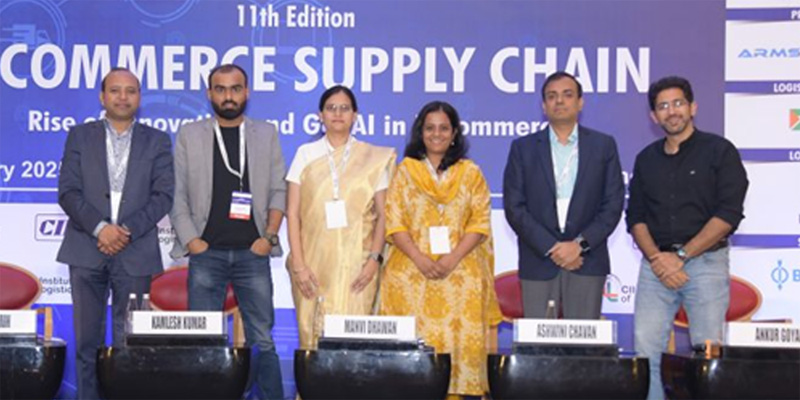
L-R Mr. Deepak Jain, Director, Argon & Co, Mr. Kamlesh Kumar, Vice President of Supply Chain, Jumbotail, Ms. Manvi Dhawan, Product Manager – Software, Armstrong Dematic, Ms. Ashwini Chavan, Associate Vice President of Supply Chain, Orkla India, Mr. Ankur Goyal,Client Partner – Industrial Sector, IBM, Mr. Nitin Manchanda, Head of Supply Chain, Amazon Fresh, Amazon
In Session 3 “How Can Emerging Technologies Enable Supply Chain to Boost Operations” the panel discussed the impact of technology and AI on improving operational productivity and enhancing customer experience. The session focused on two key areas where technology plays a vital role: faster decision-making using digital twins and AI-driven predictive analytics for real-time insights. The panel highlighted situations where AI should be avoided, such as when data quality is poor or in highly sensitive decisions. They also emphasized the importance of balancing technology use to avoid over-reliance and skill gaps and discussed the necessary data security measures for safe AI implementation.
CII Institute of Logistics organised the 2nd Edition conference on “Solution de Technology Automation and Robotics” with the theme of “The North STAR of Logistics” on 30th August 2024 in Mumbai. The conference captured key themes related to the evolution of Supply Chain and Logistics functions in India, including government policy support, modern industry practices and technological interventions, The conference drew significant participation with 240 influential figures and thought leaders from all over India.
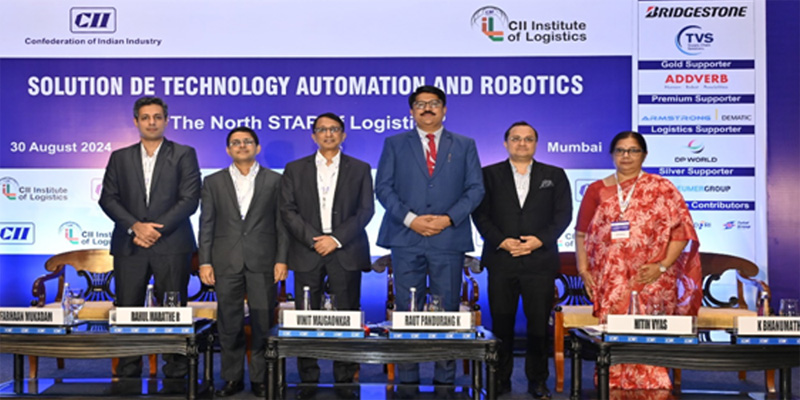
(L-R) Mr Farhaan Mukadam, Senior Director, Alvarez & Marsal, Dr. Rahul Marathe R, Professor, Department of management studies, Indian Institute of Technology, Madras, Mr. Vinit Majgaonkar, Chairman – STAR Committee and Chairman, Armstrong Dematic, Dr. Raut Pandurang K, Deputy Director General of Shipping, Ministry of Ports, Shipping and Waterways, Government of India, Mr. Nitin Vyas, Member -CII Institute of Logistics Advisory Council & Chief Executive Officer – Cluster ASIA,BEUMER Group, Dr Bhanumathi, Chief Operating Officer, CII Institute of Logistics.
During inaugural session, Dr Raut Pandurang K, Deputy Director General of Shipping, Ministry of Ports, Shipping and Waterways, Government of India, delivered the inaugural address, focusing on the Maritime Amrit Kaal Vision 2047, emphasizing the pivotal role of technology, automation, and robotics in enhancing port operations and efficiency. He stressed the need for adopting world-class technology and equipment with a focus on sustainability. Dr. Raut outlined key initiatives to boost port productivity, including automating warehouse inventories to improve accuracy and efficiency. He also highlighted the Unified Logistics Interface Platform (ULIP) for streamlining logistics and the Sagar-Setu National Logistics Portal (Marine) for optimizing port systems. The session also highlighted that India is expected to become the world’s third-largest economy by FY28, shifting from service exports to focusing more on manufacturing and merchandise exports. The Indian government aims to increase the manufacturing sector's GDP contribution from 16% to over 20% within the next 2-3 years through initiatives like Make in India and Production-Linked Incentive schemes. To compete with global export hubs, India needs to improve efficiency and quality in manufacturing and logistics, as logistics currently account for 10-20% of production costs. With changing domestic consumption patterns, a strong logistics system is crucial for managing diverse SKUs, fast deliveries, and better tracking. Additionally, the state of technology in cold chain logistics was discussed. Knowledge report on “Logistics Automation: A strategic imperative Managing Director to India’s growth” released during the inaugural.
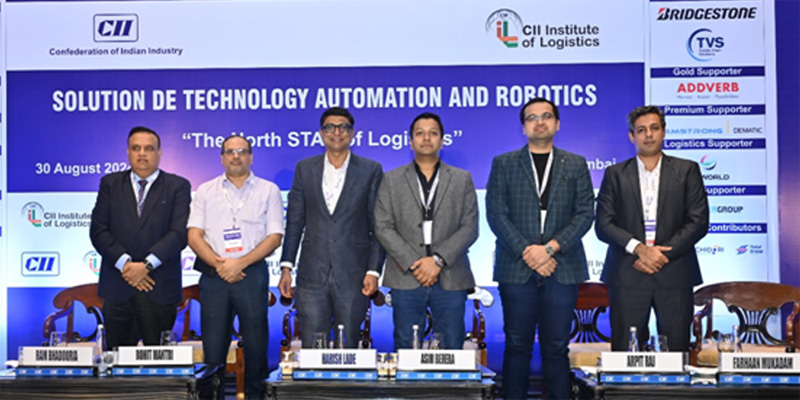
(L-R) Mr. Ram Bhadouria, General Manager of Engineering and Projects, South Asia, Unilever, Mr. Rohit Mantri, Head ImpACT of Unified S&OP & Connected Planning, Tata Motors, Mr. Harish Lade, Vice President Supply Chain, Asian Paints, Mr. Asim Behera, President, Daifuku Intralogistics India Pvt. Ltd, Mr. Arpit Raj, Head of Logistics and Customer Service, Godrej Consumer Products Limited, Mr Farhaan Mukadam, Senior Director, Alvarez & Marsal.
“Session1: Automation triumphs from the horse’smouth” focused on the rising urgency of automation in today's fast-paced world, highlighting how technological advancements have lowered the barriers to entry while also introducing complexities in implementation. Industry experts shared compelling success stories of supply chain transformation. The session explored how they conceptualized their automation strategies, planned budgets, and calculated ROI, offering practical insights into the financial aspects of the automation journey. It emphasized the importance of organizational readiness and strategic alignment as key prerequisites for enterprise-level technology adoption. Tangible benefits achieved through automation, such as improved efficiency, resource management, and operational flexibility, were also highlighted. Additionally, challenges and failures encountered during the automation process were discussed, with valuable lessons learned and advice on navigating common pitfalls. This comprehensive discussion provided actionable insights for businesses looking to harness technology and drive innovation in their supply chain operations.
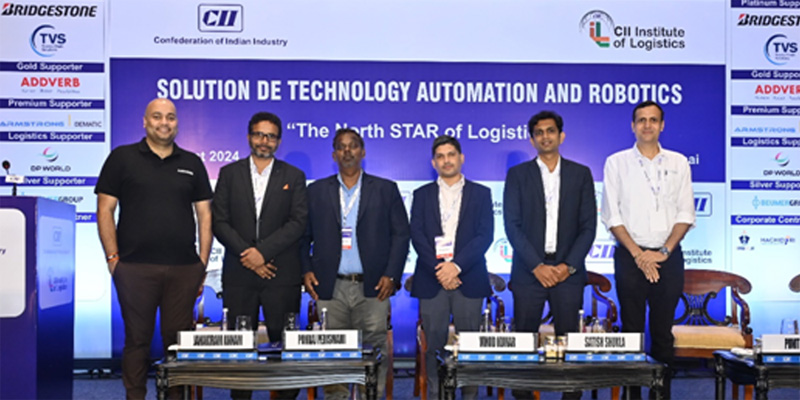
Mr. Satish Shukla, Co-Founder and Chief Marketing Officer, Addverb Technologies, Mr. Janakiram Annam, Founder, Hachidori Robotics Private Limited, Mr. Ponraj Periswami, Head of Supply Chain Management, Wahl Clipper Corporation, Mr. Vinod Kumar, Head of Supply Chain, CEAT Limited, Mr. Punit Modi, Director Global Supply Chain Analytics (Benchmarking), Mondelez International, Mr. Shakti Choube, Senior Vice President & Business Head of Intralogistics Automation, Craftsman Automation Ltd
Session2 “Fixed Flexible or Fusion Discovering the ultimate truth” focused on the future of automation, examining whether businesses should invest in fixed automation, adopt flexible solutions, or combine both through a multi-agent orchestration platform. It emphasized how integrating fixed and flexible automation with advanced orchestration can boost efficiency and agility. The session also explored the potential of Robotics-as-a-Service (RaaS) and its synergy with flexible automation, demonstrating how these technologies can transform operations and drive future success. Through real-world examples, the discussion highlighted the benefits and limitations of both fixed and flexible automation systems, showcasing their impact on industries. The session also included insights from experienced users and suppliers, exploring future automation trends and how the fusion of these technologies can foster innovation and operational excellence in supply chains.
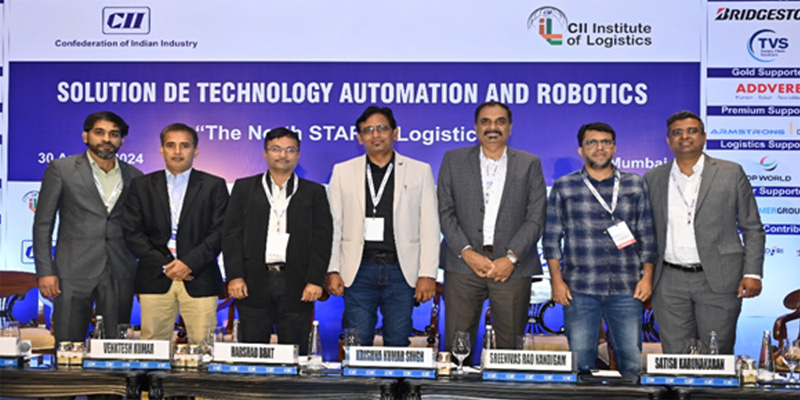
(L-R) Mr. Mahidhar, Senior Managing Consultant, Supply Chain Leader, IBM Consulting, Mr. Venktesh Kumar, Co-Founder and Managing Director, StackBOX, Mr. Harshad Bhat, Head of Logistics, Wurth India, Mr. Krishna Kumar Singh, Director Supply Chain Management, South Asia, Hafele India Private Limited, Mr. Sreenivas Rao Nandigam, Global Head of Supply Chain, Sun Pharma, Mr. Satish Karunakaran, Director of Transformation, Pepe Jeans India Limited, Mr. Ajit Jangle, Managing Director , FM Logistic India.
Session3 “Mastering the tech stack the backbone of digital supply chain” focused on the pivotal role of the technology stack in cyber-physical systems, highlighting it as essential for successful transformation. It explored how automation and robotics are reshaping supply chains and the need to integrate advanced systems and emerging technologies such as IoT, GenAI, control tower planning, and risk management. The discussion highlighted the essential components of the tech stack that drive efficiency and enhance workflows, while also addressing the challenges of implementation. Key future trends in supply chain technology were examined to help navigate these complexities, with a focus on how a well-integrated tech stack can be the linchpin of a digital strategy, ensuring a successful investment and long-term success.
CII Institute of Logistics organised the 18th Edition conference on “Building Warehousing Competitiveness” with the theme of “Unlocking growth through intelligent warehousing” on 21st June 2024 in Mumbai. The Conference addressed three key aspects of modern warehousing namely Enhancing customer experience through modern warehousing, transforming operations through smart warehousing and building a robust warehousing ecosystem to drive growth.The conferencedrew significant participation with 250 influential figures and thought leaders from all over India.
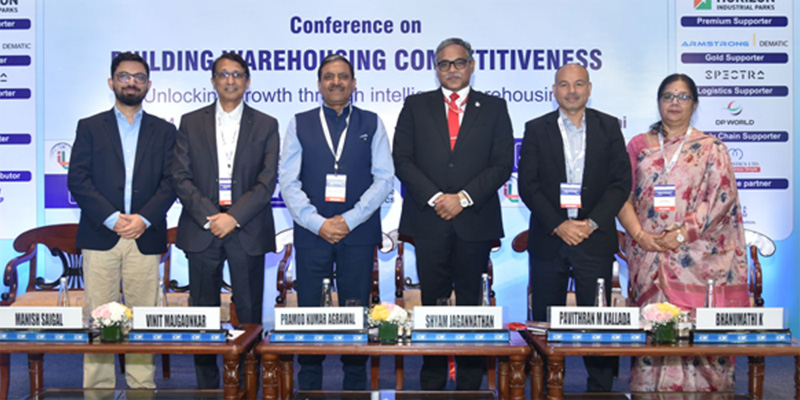
(L-R) Mr. Manish Saigal, Managing Director, Alvarez & Marsal, Mr. Vinit Majgaonkar, Chairman – STAR Committee & Chairman, Armstrong Dematic, Mr. Pramod Kumar Agrawal, Principal Chief Commissioner of Customs, Mumbai Customs Zone-I, Mr. Shyam Jagannathan, Director General of Shipping Ministry of Ports, Shipping and Waterways, Government of India, Mr. Pavithran M Kallada, Managing Director Indian Subcontinent, BDP UGL Global Logistics India Pvt.Ltd. Dr Bhanumathi, Chief Operating Officer, CII Institute of Logistics.
“Session1Enhancing Customer Experience Through Modern Warehousing” focused on the evolution of warehousing in India from traditional 'godowns' to organized, technologically advanced logistics parks with multiple warehouses and value-added services. It was emphasized that modern facilities ensure efficient space utilization, smooth vehicular movement, and ESG compliance. This transformation is driven by changing customer needs, the establishment of a robust logistics ecosystem, and efficient supply-chain models like the 'hub-and-spoke' system. The session highlighted how increased capital investment and government schemes like the Production Linked Incentive (PLI) are boosting production and demand for larger warehouses. Initiatives such as the National Logistics Policy, PM GatiShakti, Sagarmala, Bharatmala, and Multi-Modal Logistics Parks (MMLPs) are contributing to an efficient logistics infrastructure. The session also highlighted the growing importance of sustainable warehousing in line with India's decarbonization goals, resulting in a growing need for large logistics parks that offer cost leadership, better infrastructure, value-added services, reduced risks, scalable operations, enhanced go-to-market strategies, innovative business models, free trade warehousing zones, and ESG-compliant facilities.
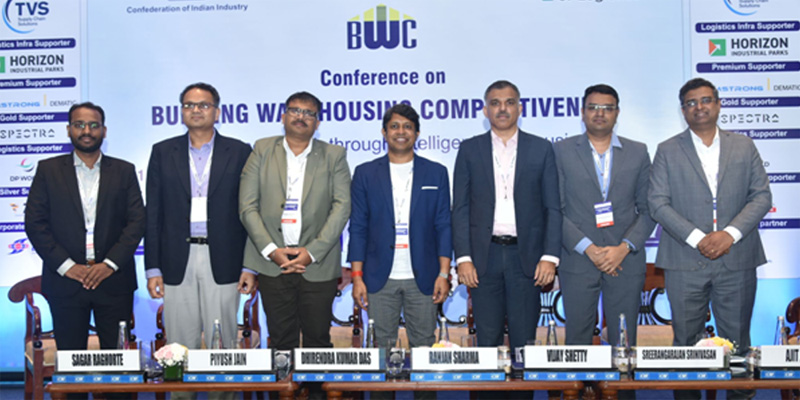
(L-R) Mr. Sagar Raghorte, Deputy General Manager Strategy & Supply Chain Management, The Belgian Waffle Co, Mr. Piyush Jain, Vice President – Soutions, Addverb, Mr. Dhirendra Das, Head of Supply Chain, UltraTech Cement, Mr. Ranjan Sharma, Chief Information Officer and Head of Supply Chain, Bestseller India, Mr. Vijay Shetty, Senior Vice President - Global Distribution and Supply Chain, Alkem Laboratories Ltd., Mr. Sreerangarajan Srinivasan, Head of Logistics and Customer service, NIVEA INDIA, Mr. Ajit Jangle, Managing Director, FM Logistic India.
“Session2 Transforming operations through smart warehousing” delved into the transformation of warehouse operations through smart practices, discussing the trend towards larger and more complex facilities. It emphasized three key drivers for enhancing efficiency. Global examples on implementations of fully automated, multi-modal logistics parks, which provide significant returns on automation investments in larger warehouses. The session stressed the crucial role of “Planning and Control” in boosting productivity through strategic planning and ERP system integration. “Mechanization and Machine Automation” were highlighted for their ability to enhance human capabilities using tools like cranes, forklifts, and automated systems. “Digital Enablement” was discussed with technologies like RFID and IoT for real-time data capture and analysis to optimize operations. Overall, the session emphasized the need for adopting smart warehousing practices to meet evolving industry demands and achieve operational excellence across supply chains.
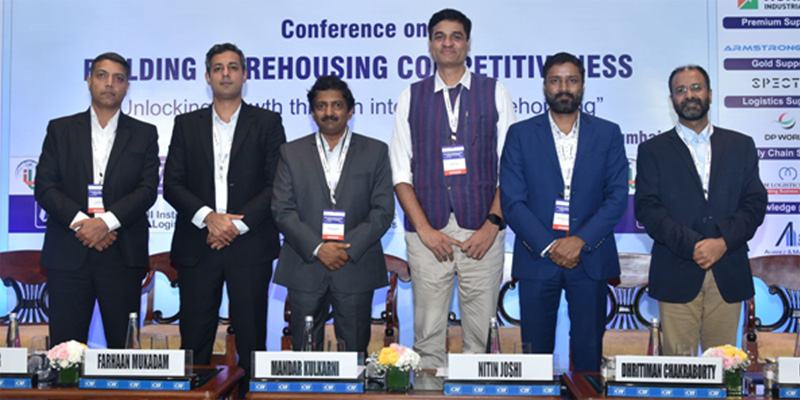
(L-R) Mr. Sai Sridhar, Principal Counsellor, CII Institute of Logistics, Mr. Farhaan Mukadam, Senior Director, Alvarez & Marsal, Mr. Mandar Kulkarni, Head of Warehouse and Logistics, Sun Pharma, Mr. Nitin Joshi, Head Warehousing & Logistics, FABINDIA LIMITED, Mr. Dhritiman Chakraborty, Director Operations, Ingram Micro, Mr. Girija Shanker, Chief Product Officer – Logistics and Service, India/South Asia A.P. Moller – Maersk
“Session3 Building a robust warehousing ecosystem to drive growth” focused on the changing landscape of warehousing in India amid economic growth. The discussions highlighted a shift towards decentralized warehousing, emphasizing the growing importance of regional centers in distribution logistics. The session underscored the necessity for a strong warehousing ecosystem, driven by increased investor interest and governmental initiatives to improve business conditions. The emergence of large-scale, multimodal logistics parks with advanced warehouses was identified as crucial for India's future warehousing trends over the next 5-10 years. Key challenges addressed included land acquisition, regulatory approvals, logistical connectivity, construction timelines, strategic location selection, supplier management, and workforce preparedness. The panel also explored how multimodal logistics parks streamline goods movement, impact regional warehousing and transportation sectors, and anticipated future developments in the warehousing industry.
The CII Institute of Logistics organized the 11th Edition of the “Global Supply Chain Summit” with the theme “Building Tomorrow: The Rise of Resilient, Sustainable, and Technology-Enabled Supply Chains” on Friday, 27th September, at The Sheraton Grand, Bengaluru. The summit focused on key sub-themes such as building resilient supply chains to mitigate risks across the value chain, creating sustainable and environmentally friendly supply chain operations, and leveraging Generative AI (GenAI) to develop best-in-class supply chains. It explored innovative operating models, world-class infrastructure, and evolving legislation to achieve these three supply chain pillars. The event saw significant participation, with 270 national and international thought leaders and influential figures from across India.

(L-R)Dr. K. Ganesh, Member, CII National Committee on Logistics & Partner McKinsey & Company, Ms. Mansi Nagri, Chief Product & Marketing Officer, Mahindra Logistics Ltd, Mr. Mallikarjuna Rao P, General Manager, Hindustan Aeronautics Limited, Mr. Pramod Kumar Agrawal, Principal Chief Commissioner, CGST, Bengaluru Zone, Government of India, Mr. Durgadutt Nedungadi, Senior Vice President International Business, Netradyne Technology India Pvt Ltd, Mr. Sukumar K Chief Executive Officer TVS Supply Chain Solutions Limited, Dr Bhanumathi K, Chief Operating Officer, CII Institute of Logistics
During inaugural session, Mr. Pramod Kumar Agarwal, Principal Chief Commissioner of CGST, Bengaluru Zone, Government of India, highlighted key revisions in customs duty rates aimed at supporting importers and exporters, simplifying trade, boosting exports, and enhancing India’s global competitiveness. He emphasized the expanded role of the Advance Ruling Authority (ARA) in expediting resolutions for GST-related supply chain disputes. Additionally, he stressed the significance of green warehousing and transportation practices in promoting sustainable logistics solutions. Mr. Agarwal outlined several CBIC initiatives to facilitate trade, including ICEDASH, ICETRACK, eSANCHIT, and TURANT, while reinforcing the government's commitment to building resilient, sustainable, and technology-driven supply chains, positioning India for continued growth in global trade. The session also discussed the significant effects of recent disruptions, social changes, and new laws on global supply chains, revealing important weaknesses and shifting industry challenges. It focused on the $330 billion Indian logistics market, which is expected to lead in sustainable supply chain solutions by 2025. The role of Generative Artificial Intelligence (GenAI) in identifying and reducing climate-related risks was also highlighted, ensuring that operations can continue during extreme weather events. Additionally, the discussion covered global strategies to improve supply chain resilience, demonstrating how sustainable practices and AI integration can enhance operations while supporting broader goals like road safety.

(L-R) Ms. Carola Wagner, Solution Leader and Associate Partner, McKinsey and Company, Mr. Neelanchal Panda, Head of Supply Chain, Himalaya Wellness Company, Mr. Hanumanth Melligeri, Plant Head, Mars Wrigley, Mr. Rajshekhar Kolkur, Chief Supply Chain Officer, Aditya Birla Fashion and Retail Ltd. Mr. Vivekanand kumathalli, Head of Supply Chain, Orkla India, Mr. Anil Arora, Founder and Managing Director, Aetos DigiLog, Mr. Anoop Chauhan, Chief Executive Officer - Contract Logistics, Subcontinent, DP World
Session1 “What does it take for a supply chain to be resilient” highlighted the importance of building resilient supply chains and how companies are making informed decisions to mitigate risks and reduce disruptions. Session discussed how modern supply networks face challenges like operational, organizational, regulatory, financial, and data security issues, with disruptions potentially costing companies up to 45% of their annual EBITDA. The session highlighted the need for greater visibility across the supply chain to sense high-impact threats and respond collaboratively through "what-if" scenario planning and dynamic optimization. They also explored the challenges companies face when shifting to risk-resilient value chains and the technologies gaining traction to enhance resilience. The session also touched on the role of autonomous planning, requiring rapid decision-making via a central nerve center, and stressed the importance of collaborating with partners to build agile, integrated supply chains.

(L-R) Ms. Suchita Bansal, Global Supply Chain Lead GM, A.P. Moller – Maersk, Mr. Manoj Sharma, Head of Supply Chain & Business Processes, Zeiss India, Mr. Abhishek Gaurav, Head of Supply Chain (Planning and logistics), Britannia Industries Limited, Dr. K Ganesh Member, CII National Committee on Logistics and Partner McKinsey and Company, Mr. Seetharam Srinivasan, Head of Operations Smart Wearables, Titan Company Limited, Ms. Florence Petit, Country Head - Supply Chain Management, Legrand India, Mr. Suumit Joshii, Chief Learning Officer and Head - Business Excellence, Addverb.
Session2 “How to create a sustainable and environment friendly supply chain” highlighted the increasing need for companies to adopt sustainable practices in their supply chains, focusing on reducing carbon footprints, improving infrastructure, and integrating new technologies. Session discussed how organizations are enhancing sustainability across the end-to-end value chain while navigating regulatory policies and overcoming challenges like cost pressures and operational resistance. Emerging trends, including circular economy practices and robotics, were highlighted as key drivers for sustainable supply chain transformation. The panel explored how companies can balance cost efficiency with sustainability, especially in warehousing and transportation, and stressed the importance of building an integrated supply chain ecosystem for long-term growth. Setting measurable targets, reducing greenhouse gas emissions, and engaging suppliers in sustainability efforts were identified as critical steps, alongside embracing lean manufacturing to optimize resource consumption and minimize environmental impact.

(L-R) Mr. Kamlesh Kumar, Senior Director - Engineering, Manhattan Associates, Mr. Bhargab Dutta, Chief Digital Officer, Century Plyboards (I) Limited, Mr. Amith S Kumar, Senior Director – Marketing, Netradyne, Ms. Tannistha Ganguly, Global Head - Warehouse Management Systems (IT Delivery), Kimberly-Clark, Mr. Raushan Rishu, Vice President Supply Chain, Jockey India, Mr. Ankush Bagwale, Head of Supply Chain Excellence, Amazon
Session3 “How can emerging technologies enabled supply chain boost operations” explored how Generative AI (GenAI) and other emerging technologies are transforming supply chain operations, making them more autonomous, agile, and efficient. The session highlighted how GenAI is particularly suited for challenges like predictive scenario planning and supply chain control towers, offering distinct use cases compared to traditional AI. Successful applications of GenAI in improving supply chain visibility through IoT, blockchain, and collaborative networks were also discussed. The evolution of Warehouse Management Systems (WMS) from basic tools to advanced productivity systems was examined, alongside insights on where warehouse automation fits best. The role of start-ups in driving supply chain innovation, particularly in AI/ML optimization and robotics, was explored. The session also shared strategies for managing disruptions with technology and addressed GenAI's opportunities and risks, stressing the need for preparation and leveraging integrated supply chains for innovation.
CII Institute of Logistics organized the 11th Edition of the Supply Chain And Logistics Excellence (SCALE) Awards 2024 on Friday, 29th November, at The Lalit, Mumbai.The one-day event took place at The Lalit, marking a significant gathering of decision-makers, including leaders from the industry and the government. SCALE Awards 2024 saw an impressive turnout, with over 200 registrations from diverse sectors, including automotive, manufacturing, electronics, infrastructure, E-Commerce, retail. The event provided a unique platform for networking, allowing attendees to connect with peers, share insights, and build professional relationships. The day began with a welcome address by Dr. K Ganesh, Member, CII National Committee, on Logistics & Partner, McKinsey and Company. Dr. Sanjeevi V, Senior Jury Member, CII SCALE Awards, provided a process briefing. The jury panel, which comprised industry stalwarts, was introduced by Mr. K V Mahidhar, Executive Director & Head of CII Institute of Logistics, and Mr. Vijay Kumar, CII National Committee on Logistics & Chief Executive Officer, Express Industries Council of India, who highlighted the centrality of the jury panel's role in the awards' selection process. Following the opening session, the morning segment featured presentations from shortlisted companies. This session witnessed compelling case study presentations from various contenders in categories such as Overall Excellence, LSP (Logistics Service Provider) Category, and the Service User Category. Each presentation offered valuable insights into the strategies and operations that advanced these organizations to the forefront of the industry, as they were rigorously evaluated on performance parameters determined by the jury. The awards ceremony commenced with welcome remarks from Mr. Clifford Patrao, Senior Partner - Data & AI, IBM. Following his address, key remarks were given by Mr. Shivkumar Balasubramanian, Senior Director of India Business, Netradyne Technology, and Dr. Sudhir Kohakade, Deputy Director General of Shipping, Ministry of Port, Shipping and Waterways, Government of India, affirming the value of collaboration and excellence in driving the industry forward. The proceeding session continued the celebration of excellence with opening remarks from Mr. Rampraveen Swaminathan, Member – CII Institute of Logistics Advisory Council & Managing Director & Chief Executive Officer, Mahindra Logistics, followed by further insights from Mr. Nilank Kumar, Commissioner of Customs – V (General), Air Cargo Complex, Government of India, and Dr. Sudhir Kohakade, Deputy Director General of Shipping, Ministry of Port, Shipping and Waterways, Government of India. The awards felicitation ceremony witnessed industry dignitaries present over 90 awards across various categories. The award categories that included areas such as Digital Excellence, Innovation, Gender Diversity, Kaizen, and Green Practices highlighted individual company achievements and reflected the industry's collective advancement towards more sustainable and inclusive practices. The event celebrated successes and inspired attendees to strive for excellence, innovation, and sustainability in their operations. As the curtain fell on another successful edition of the SCALE Awards, the industry looks forward to next year's event, eager to continue fostering relationships, sharing best practices, and celebrating the achievements that drive the supply chain and logistics sector forward. To Know more about SCALE 2024 winners kindly visit : https://scale.ciilogistics.com/
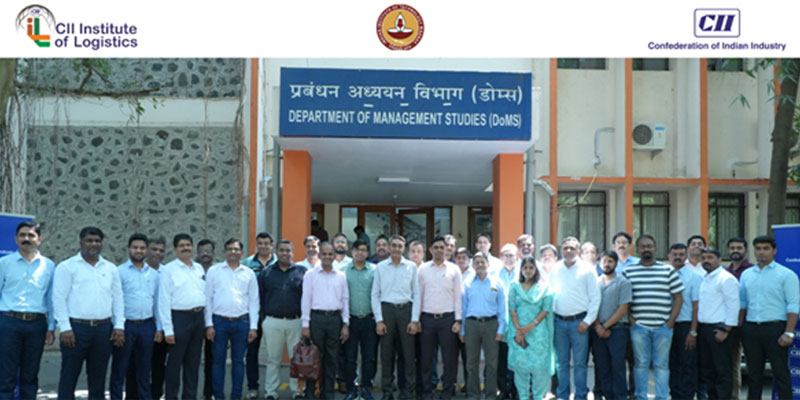
CII – Institute of Logistics, in collaboration with IIT Madras, successfully conducted the 1st edition of a five-days in-campus (IITM) certification workshop on "Strategic Supply Chain Mastery: Navigating Risks, Technologies & Performances" in February 2025. This workshop was part of a unique industry-academia initiative aimed at empowering supply chain professionals with advanced strategic insights and practical tools to manage modern-day supply chain complexities. This 5-day in-campus CII IL – IITM workshop attracted 35 decision-makers, senior and mid-level professionals from various industries including logistics, manufacturing, engineering, energy, and automotive. Participants engaged in a structured and immersive learning experience that blended academic expertise with real-world industry relevance, encouraging cross-sector knowledge exchange and collaborative thinking. Over five days, the workshop addressed a wide spectrum of topics essential for building resilient and performance-driven supply chains. Core modules included the strategic role of supply chains, customer-centric supply chain design, managing uncertainty through inventory, and enhancing efficiency through well-informed supply chain decisions. A significant focus was placed on data-driven decision-making through sessions on modeling for strategic planning, demand forecasting, and supply chain coordination. Participants explored simulation games like the Bullwhip effect and aggregate planning to understand real-world implications and develop problem-solving capabilities in dynamic scenarios. The workshop concluded with a thought-provoking panel discussion and formal certificate distribution, followed by a guided tour of the IIT Madras campus. This allowed participants to experience one of India’s leading academic environments and reflect on the value of continuous learning and innovation in supply chain leadership.
CII Institute of Logistics organized the 19th edition of the "Building Warehousing Competitiveness" conference on the theme "Warehouse Design: Building for the Future" on Tuesday, 22nd April 2025, at St. Regis, Mumbai. The conference focused on key themes including Building Smart Spaces for Intelligent Operations, Strengthening Urban Logistics and Micro Fulfilment, and Human-Centric Design in Modern Warehouses, providing valuable insights into improving warehouse operations to meet India’s evolving logistics needs. The sessions covered practical approaches such as implementing cost-effective automation, using data for space optimisation, setting up urban fulfilment centres, and creating safe and efficient work environments. Emphasis was placed on the role of smart technologies, sustainable practices, and ergonomic design in building future-ready, scalable, and people-focused warehousing systems. The conference saw strong participation, with over 190 national leaders and experts sharing their knowledge and experiences
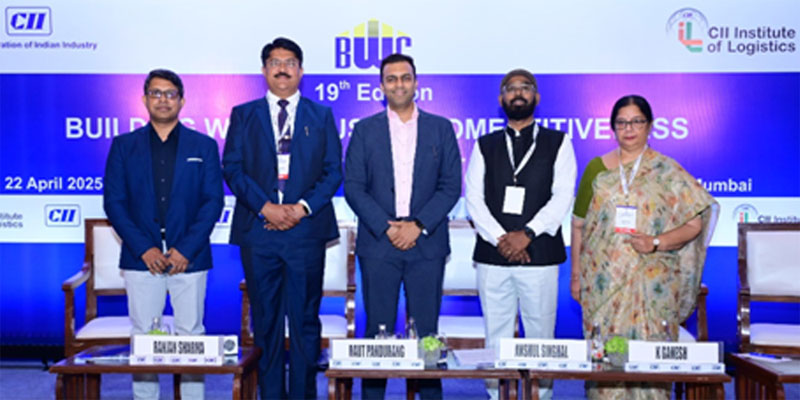
(L-R) Mr. Ranjan Sharma, Chief Information Officer andHead of Supply Chain, Bestseller. Dr.Pandurang Raut, Senior Deputy Director General of Shipping, Ministry of Ports, Shipping and Waterways (India), Government of India. Mr. Anshul Singhal, Chairman – CII Warehouse National Network and Co-Founder & Managing Director, Welspun One. Dr K Ganesh, Member, CII National Committee on Logistics & Partner, McKinsey & Company
During inaugural session, Dr.Pandurang Raut, Senior Deputy Director General of Shipping, Ministry of Ports , Shipping and Waterways (India), Government of India highlighted the importance of a coordinated approach to improve logistics efficiency and reduce costs, need for better alignment across agencies to strengthen first and last mile connectivity. He also shared ongoing green initiatives at major ports, including the use of renewable energy, energy-efficient equipment, and shore-to-ship power supply. On the digital front, he spoke about developments like the Maritime Single Window (MSW), integration of port community systems with national logistics platforms, and Customs-led initiatives such as e-BRC and digital invoice tracking. Dr. Raut also emphasized the role of bonded warehouses in supporting trade and value-added services, and highlighted government programs like SMILE and Sagarmala that are shaping the sector’s growth. He concluded by underlining the importance of modern warehousing practices like layout optimization, lean operations, and technology adoption. The session further emphasized that designing warehouses for the future means going beyond physical infrastructure. It involves embedding technology into the planning stage to create smarter, more efficient logistics hubs. With strong support from policies like the National Logistics Policy and PM GatiShakti, India is moving towards a new generation of scalable and digitally integrated warehousing solutions. Warehouses today are expected to operate as high-performance fulfilment centres—enabled by IT systems, data-driven planning, automation, and real-time visibility. This integration of design and technology is essential to build agile, secure, and sustainable supply chain infrastructure that can meet both current and future demands.
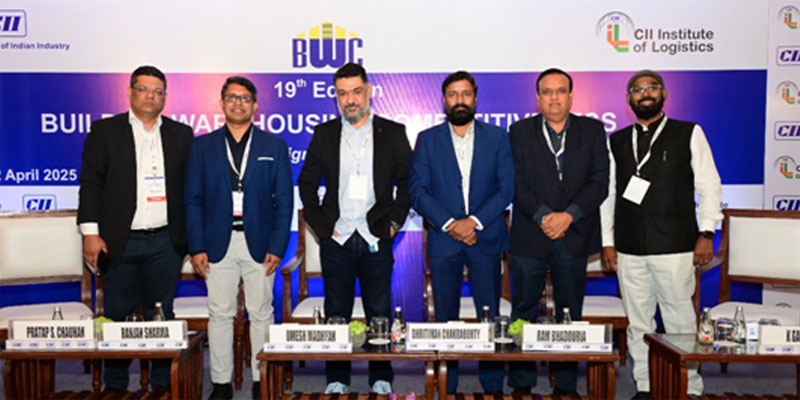
(L-R) Mr. Pratap S. Chauhan, Head of EXIM, Jindal Stainless Ltd, Mr. Ranjan Sharma, Chief Information Officer and Head of Supply Chain, Bestseller, Mr. Umesh Madhyan, Chief Operating Officer, LEAP India, Mr. Dhritiman Chakraborty, Director Operations, Ingram Micro, Mr. Ram Bhadouria, General Manager of Engineering and Projects - South Asia, Unilever, K Ganesh, Member, CII National Committee on Logistics &Partner, McKinsey & Company
In Session 1 Building Smart Spaces for Intelligent Operations, the discussion focused on how Indian warehouses are shifting from theoretical discussions to practical, cost-effective technology solutions suited to local challenges. Key issues such as inventory inaccuracies, labor shortages, and space constraints were addressed through affordable automation, IoT-enabled inventory tracking, and data-driven space optimization. Real-world examples and case studies were presented to showcase how these technologies are being effectively implemented to improve operational efficiency and build smarter, more agile warehouse environments across the country.
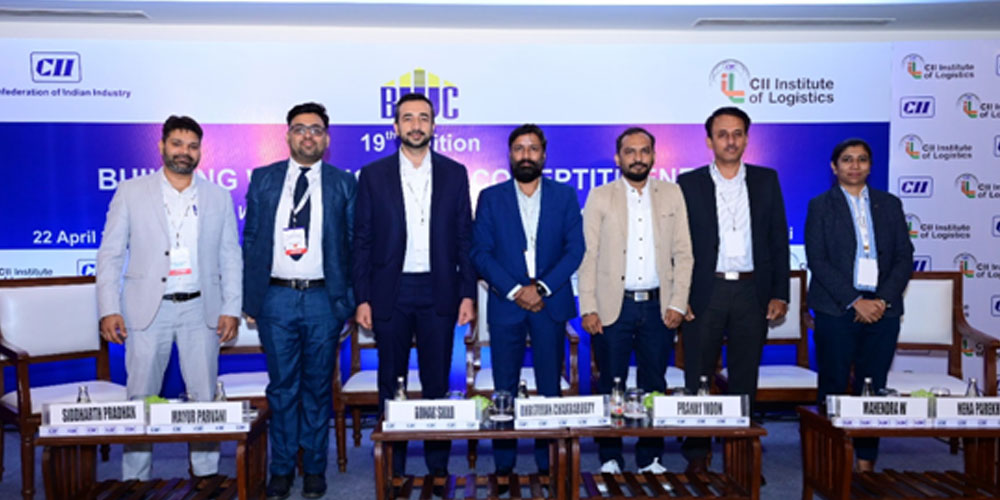
(L-R) Mr. Siddharth Pradhan, Regional Sales Manager of North & East, System Logistics, Mr. Mayur Parvani, Lead demand planner, Ultratech Cement, Mr. Ronak Shah, Executive Director, V-Trans (India) Ltd – A SCALE Award Winner, Mr. Dhritiman Chakraborty, Director Operations, Ingram Micro, Mr. Pranay Moon, Associate Director of SCM Planning & Growth, Zepto, Mr. Mahendra W, Head of Projects & Development, Horizon Industrial Parks, Ms. Neha Parekh, Director, NIVEA INDIA
In Session 2, Strengthening Urban Logistics and Micro Fulfilment, the panel members discussed the growing challenges of managing logistics in India’s crowded cities, especially where traffic congestion, limited space, and regulatory issues are common. They shared practical insights on setting up micro-fulfilment centres closer to demand hubs, using multi-level warehousing to optimise land use, and adopting electric vehicles and alternative delivery models to improve sustainability. The discussion also highlighted the need for stronger partnerships and collaboration among industry players and local authorities to overcome urban logistics barriers and improve last-mile efficiency.
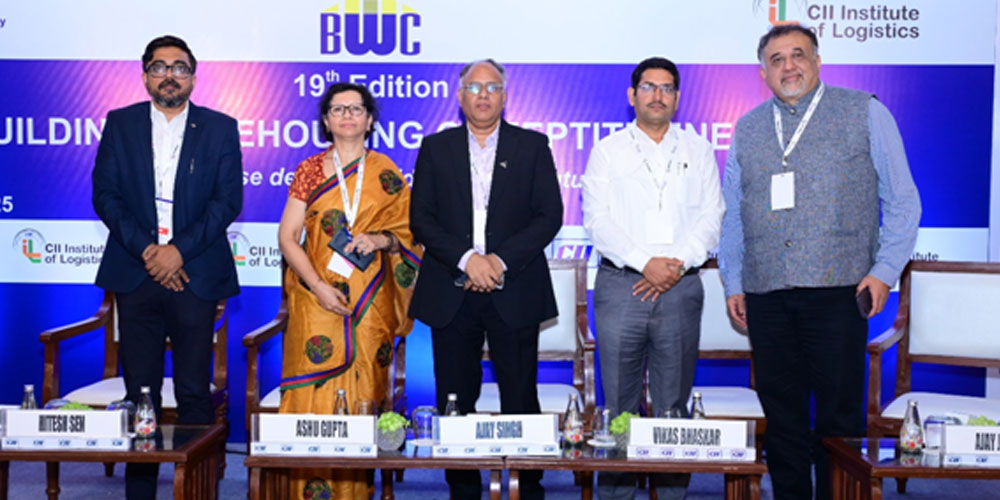
(L-R) Mr. Hitesh Sen, General Manager of Operation & Regional Head – West Region, TCI Supply Chain Solutions - A SCALE Award Winner, Ms. Ashu Gupta, Vice President Supply Chain Management, Koye Pharmaceuticals Pvt Ltd, Mr. Ajay Singh, Chief Supply Chain Officer and Vice President, Hindustan Platinum, Mr. Vikas Bhaskar, Head of Logistics, Birla Opus, Mr. Ajay Jhalani, Managing Director, Winner technoplast private limited
In Session 3, Human Centric Designin Modern Warehouses, panel members discussed the need to create safer and more supportive work environments across warehouses. They shared insights on improving day-to-day working conditions through ergonomic layouts, proper safety protocols, and regular training. The discussion also highlighted how technology is being used to enhance worker safety—such as wearables and monitoring systems—and the importance of upskilling the workforce. Panel members emphasized that understanding cultural needs and ensuring worker comfort can lead to better productivity and a more engaged workforce.
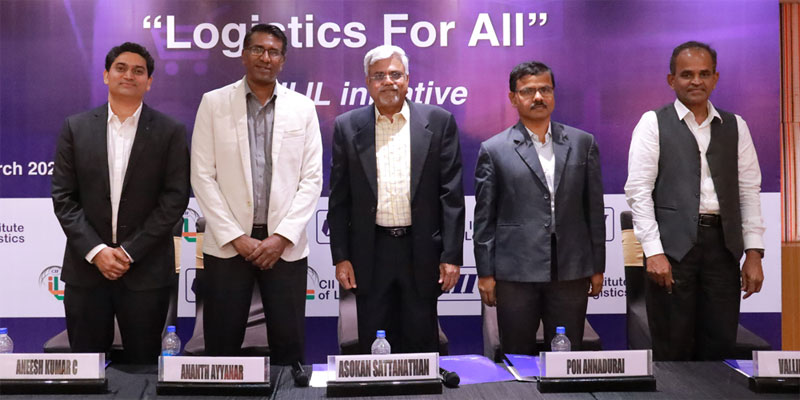
The Confederation of Indian Industry (CII), through its Institute of Logistics, organized an interactive session in Coimbatore aimed at igniting young minds and guiding them towards promising careers in the logistics sector on 12th March 2025. As logistics becomes a vital component of India’s economic development, this initiative aligns with CII’s vision to position India as a "Global Logisticians Hub" under its mission "Logistics for All." Coimbatore’s strategic location and strong industrial base make it a crucial part of India’s logistics network. With excellent connectivity to major ports like Kochi and Chennai, the city hosts over 50,000 industries across small, medium, and large scales. It is also a significant supplier to the motor and pump industry, meeting over 40% of India’s demand, while the nearby Tiruppur textile cluster accounts for 90% of the country's cotton knitwear exports. Expanding industrial parks across various sectors further reinforce Coimbatore’s role as an economic hub. With well-established industries in textiles, engineering, automobile components, and precision manufacturing, alongside a robust logistics infrastructure including ports and road networks, Coimbatore was an ideal venue for this initiative. India’s logistics sector is set for rapid expansion, driven by growth in e -commerce, manufacturing, and Global Capability Centres (GCCs). The country has become a preferred destination for global enterprises seeking efficiency, cost optimization, and innovation. This evolution is expected to create between 1.5 to 1.7 crore jobs by 2030, making a significant impact on the global workforce. The CII Institute of Logistics plays a pivotal role in transforming the sector by acting as a collaborative platform that connects policymakers, industries, academia, training institutions, and society to develop a world-class logistics workforce. To achieve this, CII has introduced key strategies focused on skill development. These include industry-specific training programs with strong job placement prospects, early career awareness initiatives for students in grades 10 and 12, and the establishment of local training centers in tier-2 and tier-3 cities to improve accessibility . Additionally, CII is actively working to make logistics a desirable career choice by developing internationally recognized training programs through global partnerships. The institute also collaborates with international industries to align standards and facilitate trainee placements, ensuring a skilled and competitive workforce. CII’s holistic approach addresses the urban-rural divide, supports both SMEs and large enterprises, and promotes gender diversity in the industry. These efforts will be instrumental in shaping future careers in global logistics and supply chain management. Speaking about the initiative, Mahidhar, Executive Director & Head of CII-Institute of Logistics, highlighted, "Coimbatore’s strategic location and dynamic industrial landscape make it an excellent city for logistics talent development. Our aim is to inspire students and equip them with the necessary skills and knowledge to succeed not only in India but also on a global scale." As logistics plays a critical role in supporting manufacturing and agriculture through efficient storage and transportation, the demand for a highly skilled workforce is greater than ever. Managing both domestic and international supply chains with enhance d efficiency requires specialized training. CII’s initiative to engage with students in Coimbatore reflects its strong commitment to fostering the next generation of logistics professionals and solidifying India’s position as a global logistics hub.
CII Institute of Logistics organized the 19th Edition of the “Automotive Supply Chain” Conference with the theme “Revving Up Innovation, Digitized Ecosystem, and AI-Powered Service” on Thursday, 6th March 2025, at Novotel, Pune. The conference focused on key sub-themes: Revving Up Innovation – Unveiling Future Strategies, creating a Digitized Ecosystem – Revealing the Secret Sauce, and AI-Powered Service – Shifting Gears with Tech Integration. It explored cutting-edge automotive supply chain models, reimagining the future of the auto industry, macroeconomics and manufacturing in India, industry scenarios, policies, initiatives, and regulatory advancements shaping the future of the automotive supply chain.The conference witnessed significant participation, with 200 thought leaders and influential figures from across India contributing their insights and expertise.
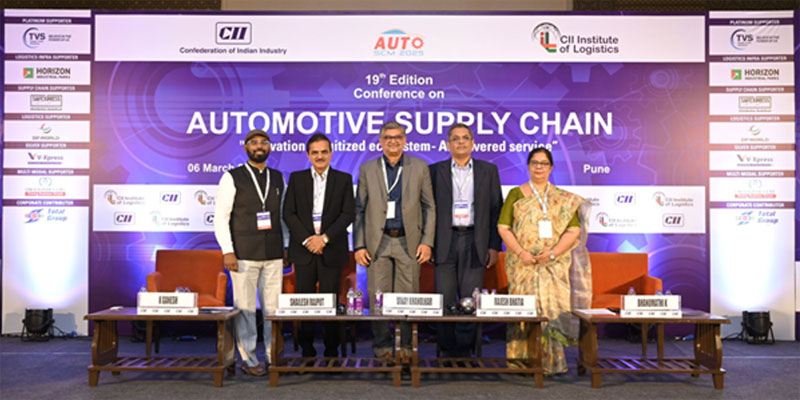
(L-R) Dr K Ganesh, Member, CII National Committee on Logistics & Partner, McKinsey & Company, Mr. Shailesh Rajput, Joint Director of Industries, Directorate of Industries, Government of Maharashtra, Mr. Vinay Khanolkar, Chief of Manufacturing Operations, Supply Chain & Engineering Mahindra and Mahindra Limited, Mr. Rajesh Bhatia, Chief Commercial Officer,TVS Supply Chain Solutions, Dr Bhanumathi K, Chief Operating Officer, CII Institute of Logistics.
During the Inaugural Session, Mr. Shailesh Rajput, Joint Director of Industries, Directorate of Industries, Government of Maharashtra, highlighted the state's proactive approach to fostering automotive growth through financial incentives, tax benefits, and subsidies, particularly for electric vehicle production and charging infrastructure. He emphasized the development of dedicated automotive clusters, logistics hubs, and plug-and-play facilities to strengthen the supply chain ecosystem. MSMEs receive support in registration, funding, quality certification, and technology upgrades to enhance manufacturing capabilities. A single-window clearance system simplifies regulatory approvals, while industry collaborations position Maharashtra as a leading automotive hub. Sustainable mobility initiatives focus on EV adoption, hydrogen fuel cells, and carbon credit programs, with incentives for battery recycling and green technologies. Export promotion efforts include financial aid for global trade participation, buyer-seller meets, and international market linkages, ensuring MSMEs remain globally competitive.
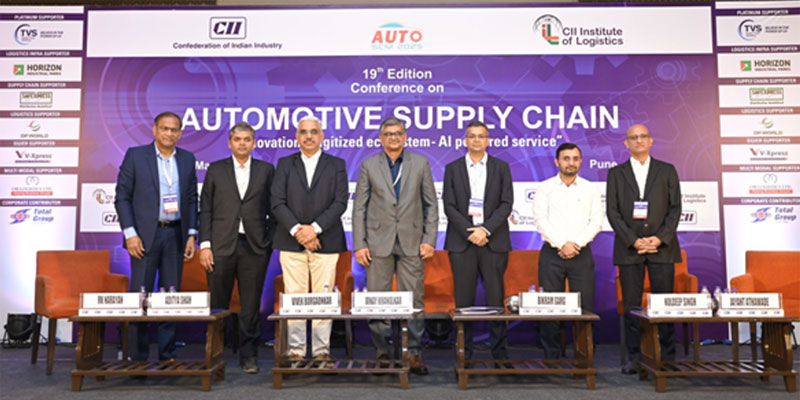
(L-R) Mr. RK Narayan, President Strategy & Business Development, Horizon Industrial Park, Mr. Aditya Shah, Executive Director, V-Trans (India) Ltd, Mr. Vivek Borgaonkar, Head Distribution & New Projects, Bridgestone India, Mr. Vinay Khanolkar, Chief of Manufacturing Operations, Supply Chain & Engineering Mahindra and Mahindra Limited, Mr. Bikram Garg, Vice President, Maruti Suzuki India Limited, Mr. Kuldeep Singh, Head - Strategic Sourcing & Supply Chain, Kinetic Green, Mr. Jayant Athawade, Senior Director - Automotive Sector, DP World Subcontinent
Session 1, “Revving Up Innovation – Unveiling Future Strategies," explored the evolving automotive supply chain landscape, addressing key challenges such as sustainability compliance, fluctuating EV demand, and cost pressures. Industry leaders emphasized the need for data-driven innovation to enhance precision in meeting changing consumer expectations, drive structural value chain changes, and foster collaboration between OEMs, suppliers, and technology firms. Discussions highlighted the critical role of logistics partners in optimizing supply chain efficiency, leveraging technology to improve logistics operations, and integrating sustainability initiatives to achieve net-zero goals. Strategies for logistics service providers to help automotive manufacturers reduce costs and enhance network optimization were examined, along with approaches to tackle EV-related challenges and capitalize on circular economy opportunities. The session also delved into supplier engagement from design to end-of-life, innovations in developer-owned industrial spaces, and sustainable practices within warehousing to minimize carbon footprints and improve employee engagement.
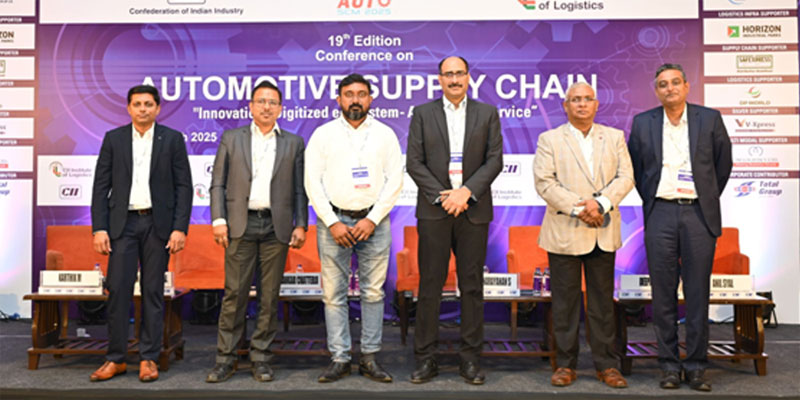
(L-R) Mr. Karthick M, Head of digital Supply Chain, TAFE Limited, Mr. Rammohan Nallanthigal, Head of Business Operations, TATA AutoComp Systems Ltd, Mr. Deepak S, Head of Logistics, Ather Energy Ltd, Mr. Anil Syal, President, Safexpress Private Limited, Mr. Shubhankar Chatterji, Chief Supply Chain Officer, Cummins India, Mr. Venkatanarayanan S, General Manager of International Procurement Services, Mercedes-Benz India Pvt. Ltd.
Session 2: “Creating a Digitized Ecosystem Revealing the Secret Sauce” discussed how digitization is transforming the automotive supply chain by integrating suppliers, manufacturers, logistics providers, and regulatory bodies. They highlighted the rise of tiered suppliers and system integrators to enhance resilience while balancing compliance and sustainability. Panel suggested tailored SaaS-based solutions to bridge the gap and enable access to digital tools. Digital Supply Networks were identified as key to managing the VUCA environment by ensuring real-time transparency. They emphasized the role of IoT, Digital Twins and hyper automation in streamlining global supply chains. The discussion also focused on the globalization of supply chains and the need for efficient data and material flow. Panel members stressed the convergence of the physical, digital, and virtual worlds to manage disruptions. They shared how SaaS solutions provide end-to-end visibility and automate compliance checks in transportation.
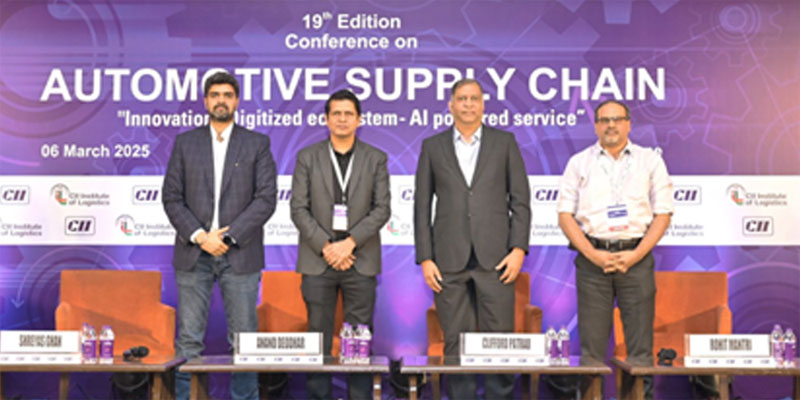
(L-R) Mr. Shreyas Ghan, Head - Supply Chain Operations & Planning, Mahindra and Mahindra Limited, Mr. Anand Deodhar, Group Chief Information Officer, Force Motors Ltd, Mr. Clifford Patrao, Senior Partner - Data & AI, IBM Consulting APAC, Mr. Rohit Mantri, Head ImpACT – Unified S&OP & Connected Planning, Tata Motors
Session 3: “AI Powered Service Shifting Gears with Tech Integration” Panel members discussed how AI is driving service transformation in the automotive industry, enhancing agility, responsiveness, and efficiency. AI, cloud computing, IoT, and blockchain are reshaping supply chain processes, with Industry 4.0 enabling smart factories and digital twins for optimization. Panel members highlighted AI’s impact across customer experience, manufacturing, supply chain, and product development, reducing the overall cost of car ownership. They shared insights on leveraging AI, starting with low-hanging fruits like predictive maintenance and demand forecasting. Managing AI risks, including data security and ethical concerns, was a key topic, along with strategies for workforce upskilling to adapt to AI-driven work environments. New ways of working, including human-machine collaboration, were explored to enhance operational efficiency. The session concluded with recommendations for leadership, emphasizing AI integration in decision-making, investment in scalable AI infrastructure, and fostering a data-driven culture for long-term competitive advantage.
The CII Institute of Logistics organized the Logistics Summit conference on Friday, 21st February 2025, at Bharat Mandapam, New Delhi, India, under the theme "Empowering States, Transforming Cities." The conference focused on two key sub-themes: Transforming cities into efficient goods movement hubs and Innovation and sustainability in logistics. The discussions delved into advanced logistics models, the future of supply chain management, macroeconomic trends, and industrial dynamics in India. Experts also explored industry landscapes, policy frameworks, strategic initiatives, and regulatory developments shaping the logistics sector. The conference witnessed the participation of 200 thought leaders and influential figures from across India, contributing valuable insights and expertise.
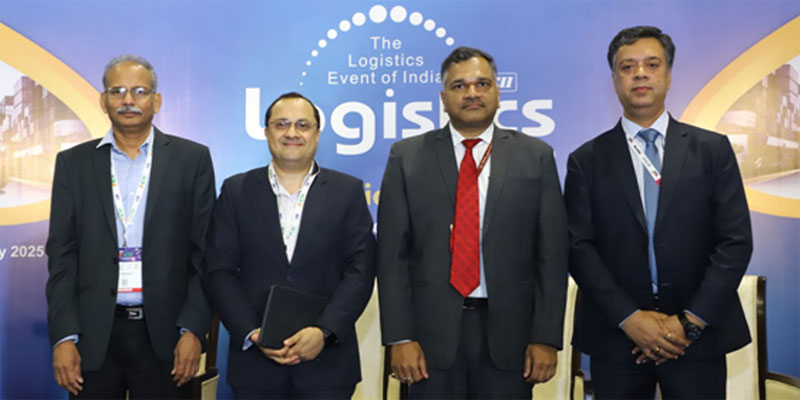
(L-R) Mr. Nitin Vyas, Member CII Institute of Logistics Advisory Council & Chief Executive Officer – Cluster Asia BEUMER Group, Mr. Rajat Kumar Saini, IAS,Chief Executive Officer & Managing Director, NICDC, Mr. Dinkar Singh, Member CII National Committee on Logistics &Director of Public Affairs, Indian Subcontinent, UPS
The panel discussion, which emphasized the need for structured city logistics plans and practical guidelines to optimize urban freight and last-mile connectivity while integrating innovation and sustainability into logistics operations. Experts highlighted the importance of dedicated freight corridors, leveraging technology such as IoT, AI, and drone deliveries for smart urban logistics, and fostering public-private partnerships to enhance infrastructure. The discussion addressed critical challenges, including traffic congestion, pollution, and inefficient last-mile delivery, while underscoring the role of policy frameworks and innovative models in transforming cities into efficient goods movement hubs. Additionally, the panel explored the adoption of green logistics practices—such as electric vehicles and renewable energy in warehouses—and how startup-driven innovations and digital platforms enhance transparency and efficiency. Balancing growth with environmental responsibility was identified as a crucial challenge, requiring appropriate financing mechanisms and collaborative efforts among industry stakeholders, policymakers, and innovators to build a resilient, sustainable, and competitive logistics ecosystem.
Over 160 national and international experts gathered at the 12th Edition of the Global Supply Chain Summit, organized by the CII Institute of Logistics, on June 13, 2025, at St. Regis, Mumbai. The theme of the summit was “India’s Green Leap Towards Net-Zero Supply Chains.” It provided a strategic platform to explore how sustainability, technology, and finance can align to create resilient and future-ready logistics ecosystems.
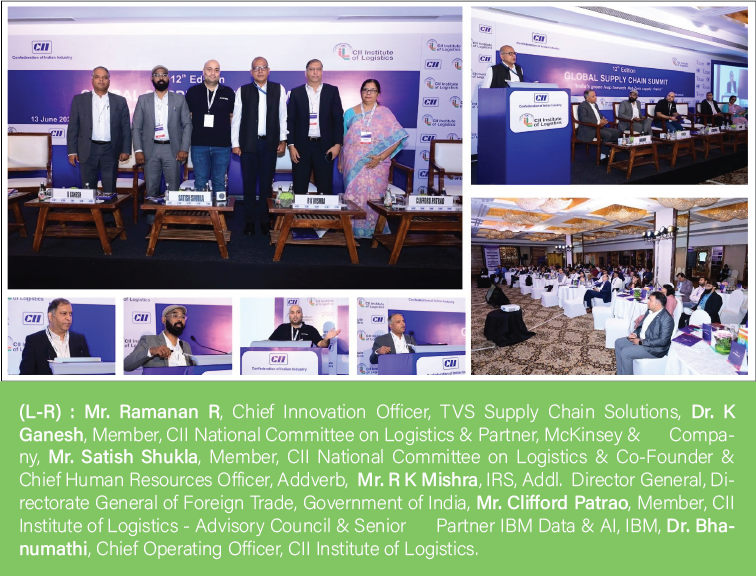
The inaugural session of the summit set a clear tone by emphasising the unrelenting, yet strategic shift needed to achieve net-zero emissions in supply chains. Speakers advocated for incremental but consistent steps toward decarbonization, urging industries to adopt a structured roadmap to fully realise their sustainability potential. Discussions highlighted the critical roles of digitisation, automation, and sustainable packaging in driving efficiency. Innovative practices such as route optimisation, paperless billing, and solar energy integration were also emphasised. It was noted that quality should be viewed as a value-adding asset rather than a cost, and that leveraging export schemes and multimodal infrastructure can significantly enhance efficiency.A major milestone during the session was the official release of the white paper titled “Resilience – Moving from Life Insurance to Competitive Advantage in Supply Chains,” which underscored resilience as a proactive, strategic asset. The session stressed the importance of redesigning packaging to maximise truck utilisation and to embrace reusable materials for reducing environmental impact. There was a strong emphasis on redefining supply chain strategies through the adoption of new technologies, building resilience, and fostering agility. Furthermore, the session acknowledged that sustainability is no longer optional; it requires conscious investment and a transformation in both consumer and industry mindsets. Speakers concluded by outlining the broader requirements for achieving net-zero emissions, which include physical infrastructure, economic alignment, and societal transformation, with cross-sector investment being the cornerstone of this global transition.
Session 1: Mobilizing Global Green Finance for Sustainable Supply Chain Transformation
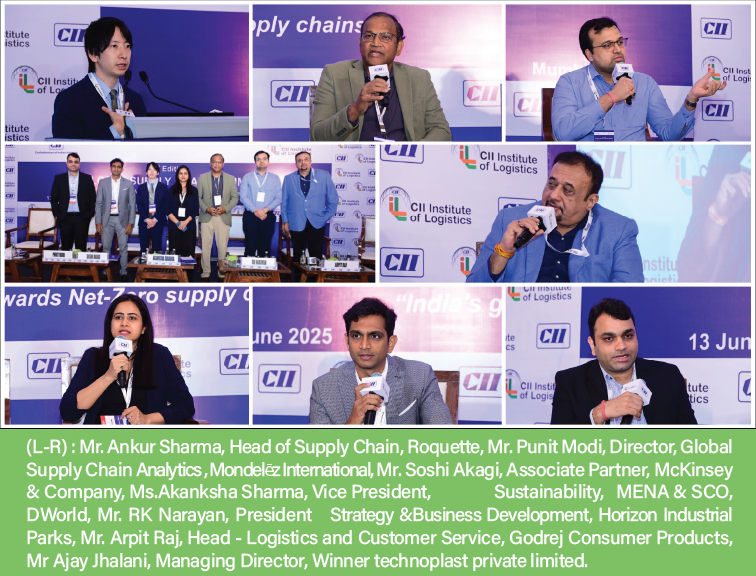
The session focused on mobilizing global green finance to support sustainable transformation in supply chains, particularly in India. Key discussions included the application of green financial instruments like green and blue bonds, and the alignment with global ESG standards. Participants emphasized the use of CO₂ calculators for measuring environmental impact and informed investment decisions. The relationship between sustainability efforts and brand value was explored, alongside the importance of responsible procurement and efficient energy sourcing. Panelists highlighted the need for long-term investment in renewable energy, challenges in shifting freight transport from road to rail, and the role of reverse logistics in waste reduction. They also underscored the necessity of climate risk assessments before infrastructure investments and the potential of digital transformation to enhance supply chain efficiency. Overall, the session emphasized the importance of bankable projects and collaborative public-private efforts to attract global capital and achieve net-zero goals.
Session 2: Cross-Border Collaboration and Technological Innovation
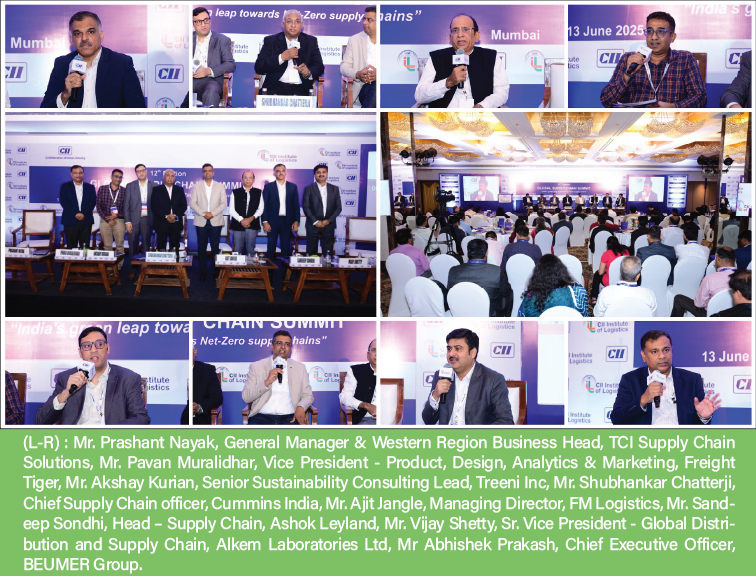
This session highlighted the importance of cross-border collaboration and emerging technologies in building sustainable and efficient global supply chains. It was emphasized that sustainability should be seen as a mindset, not just a compliance issue, and must be integrated into all operations. Speakers compared logistics practices worldwide, demonstrating the need for technology-driven supply chains supported by systems like Warehouse Management Systems (WMS), Transportation Management Systems (TMS), and Enterprise Resource Planning (ERP). Digital tools can significantly enhance accuracy and supply chain visibility. Innovations such as RFID tracking, Vehicle-to-Grid (V2G) energy transfer, and effective working capital use were discussed. The focus was also on reducing empty miles, digitizing logistics, and leveraging leading indicators for better decision-making. The integration of sustainability tools like Digital Product Passports (DPP) and blockchain for traceability was explored. Overall, the session underscored that consistent digital adoption and real-time analytics are vital for achieving smart, net-zero supply chains.
Session 3: Global Technology Transfer and Innovation for Net-Zero Supply Chains
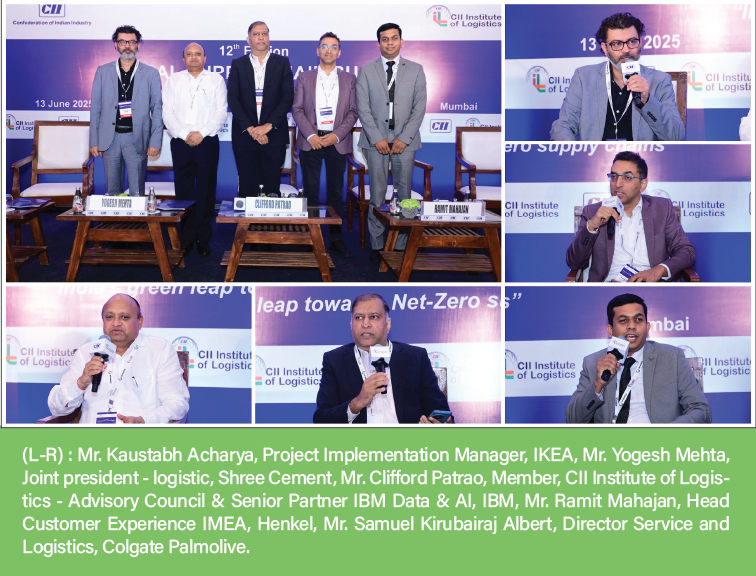
The third session focused on actionable strategies for accelerating the transition to net-zero supply chains through technological innovation and global collaboration. Discussions emphasised optimising electric vehicle (EV) logistics, addressing range anxiety with strategic delivery sequencing, and leveraging government subsidies from PHASE I and II. Key points included the need for harmonised EV policies across states and long-term battery banking regulations. Panellists highlighted the importance of practical solutions for sustainability, with recyclable packaging materials like aluminium tubes showcased for their cost-effective carbon footprint reduction. Additionally, speakers called for better alignment between organisational efforts and government policy to ensure supply consistency and enhance EV infrastructure. The session concluded by reaffirming India's commitment to achieving net-zero emissions by 2070, emphasizing the importance of policy reforms, innovation, and intergenerational responsibility in driving sustainable supply chain changes.
